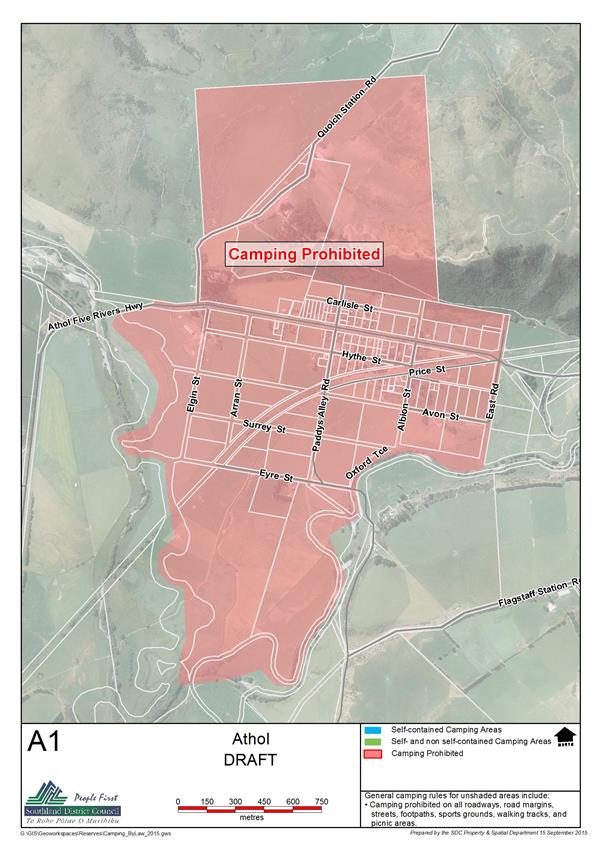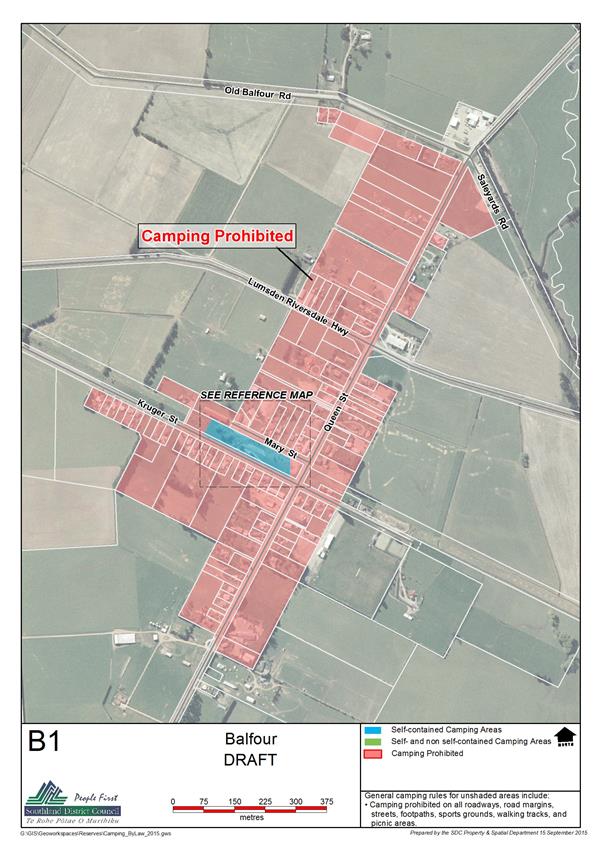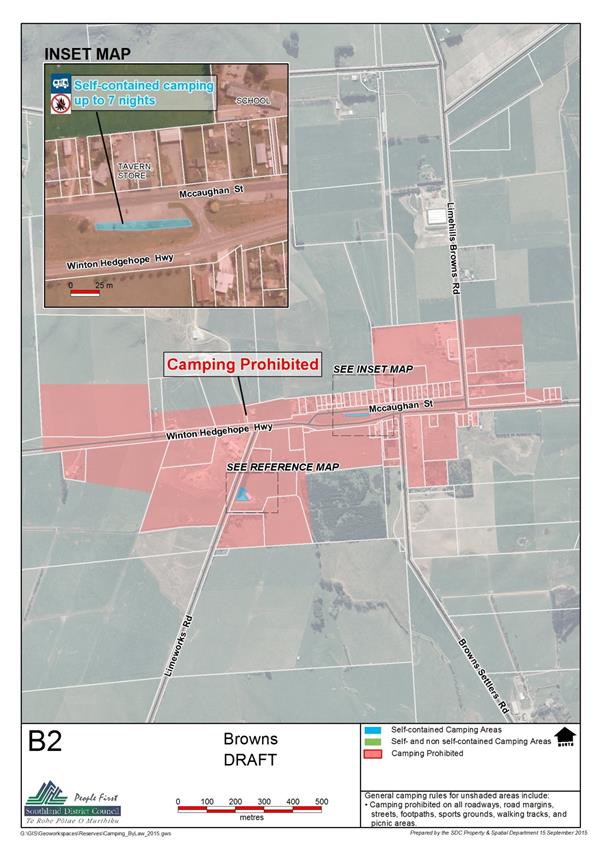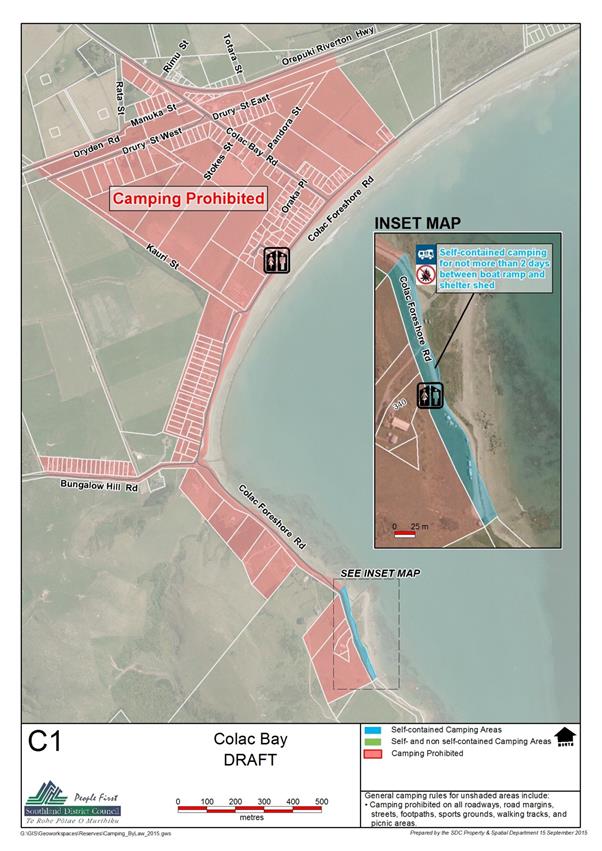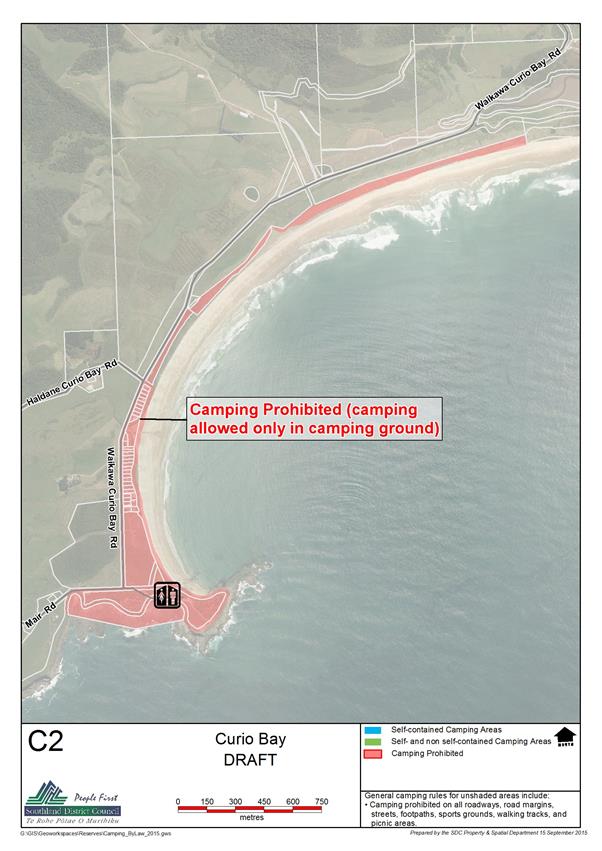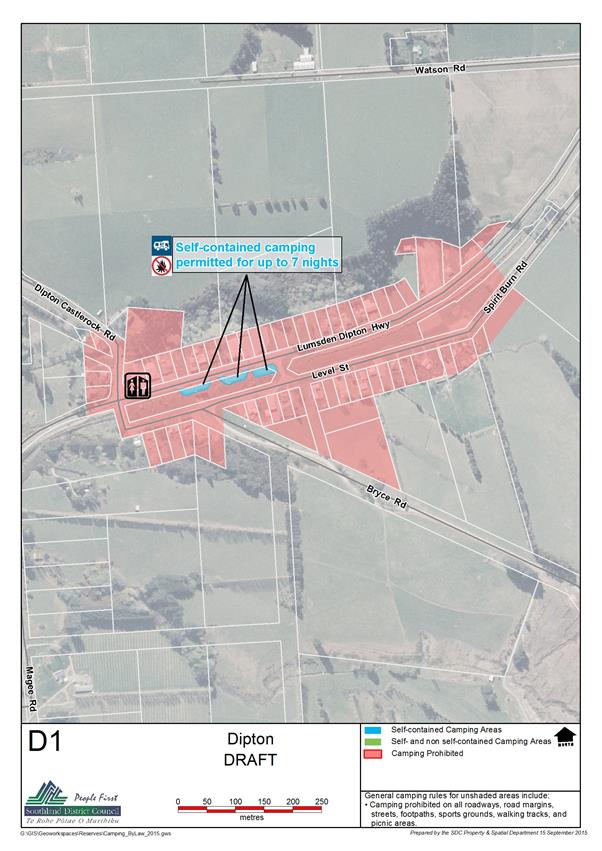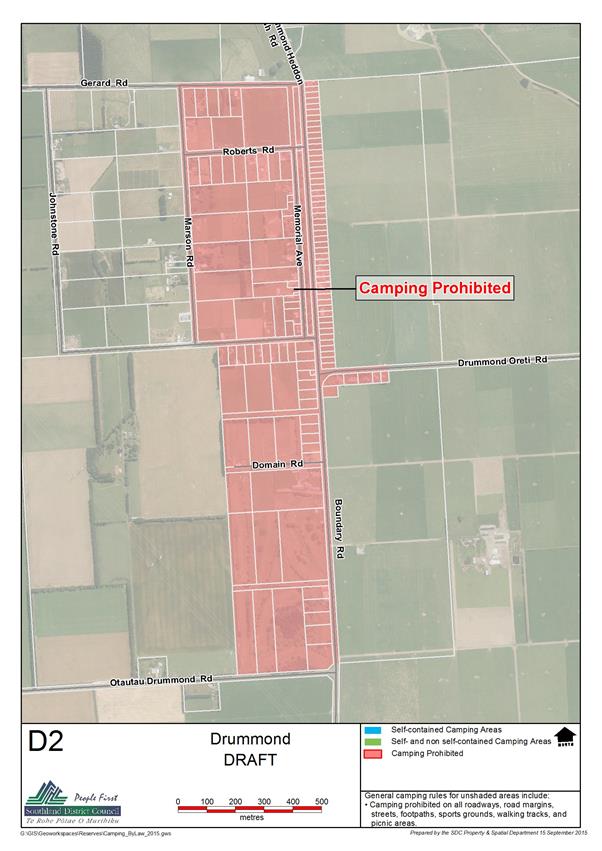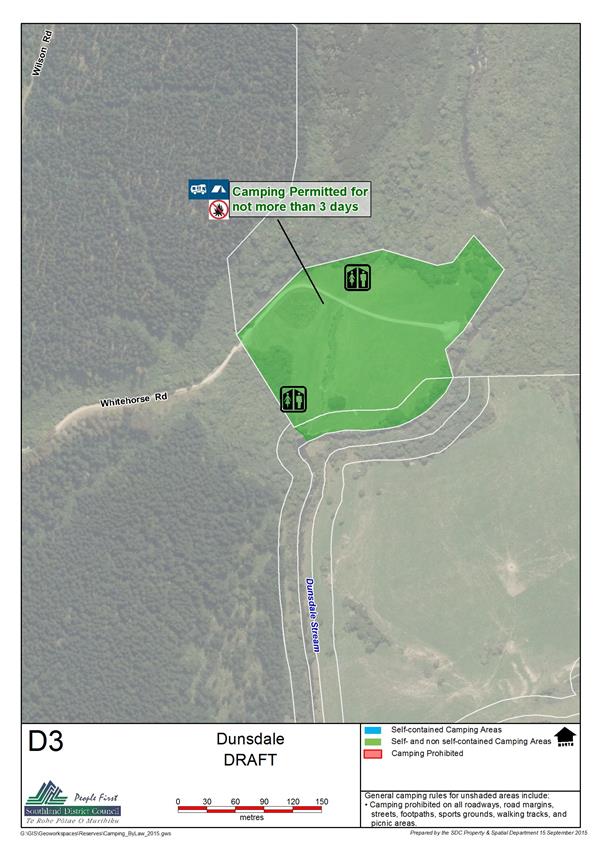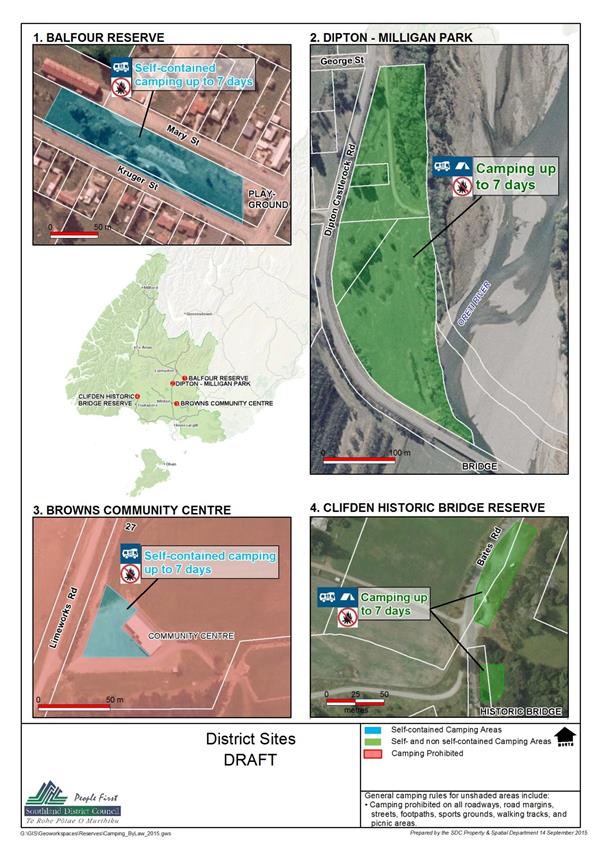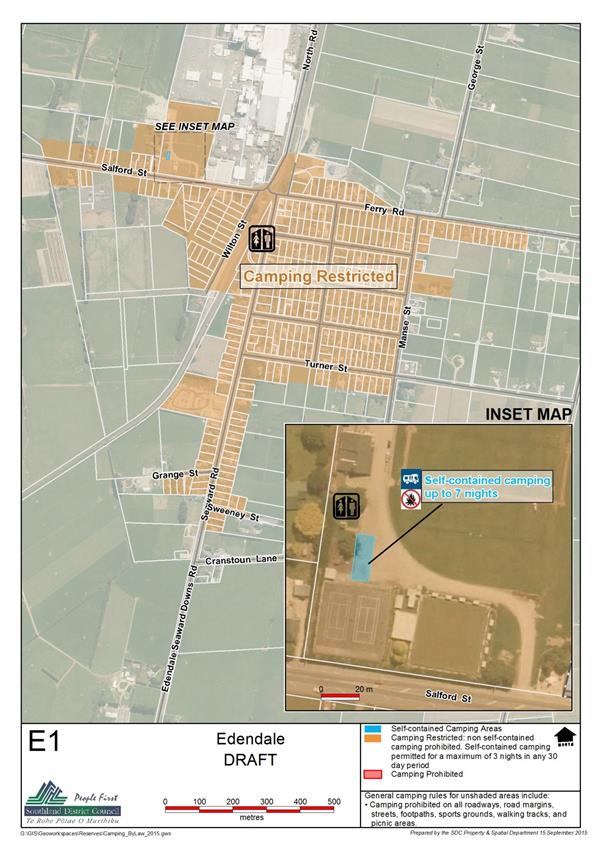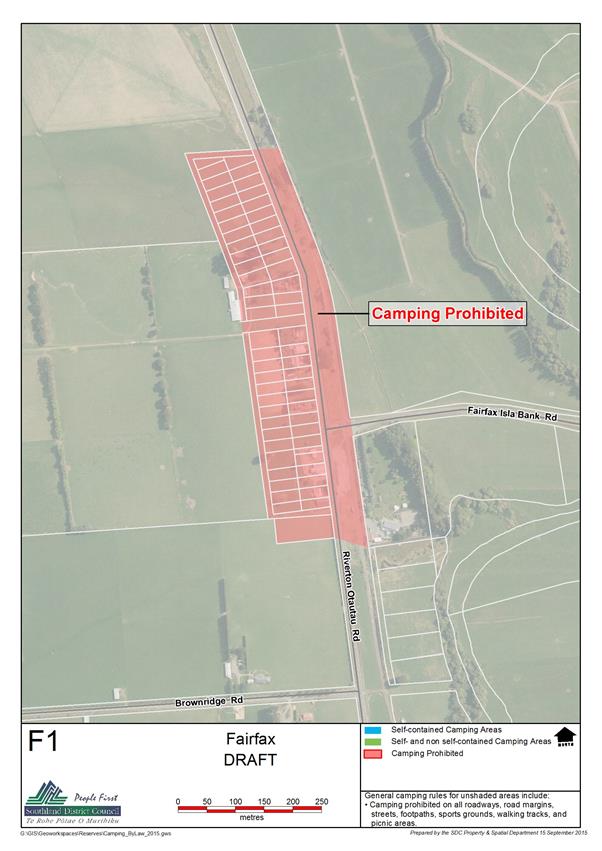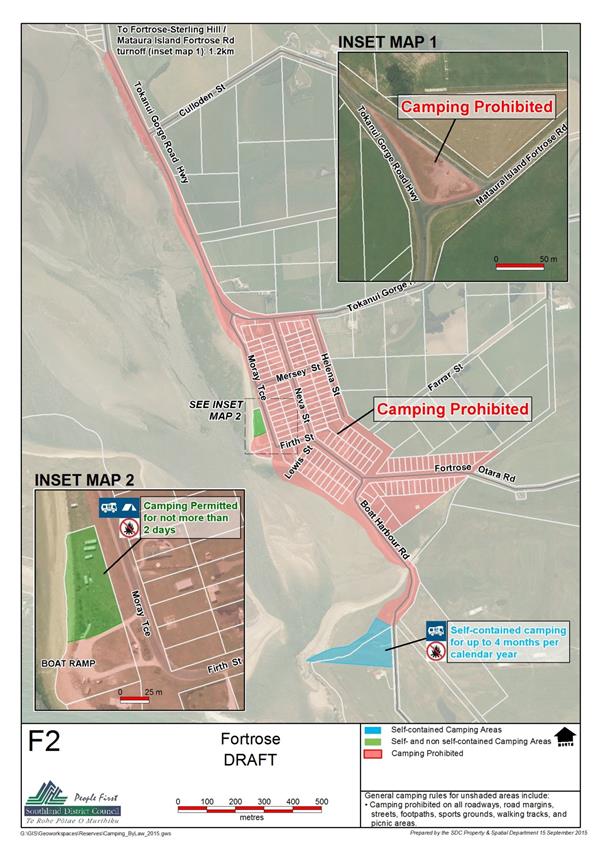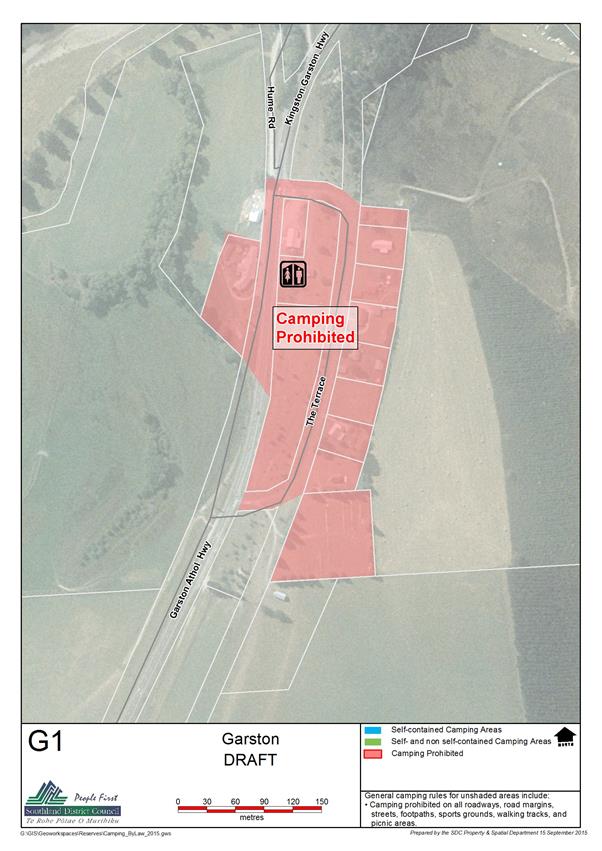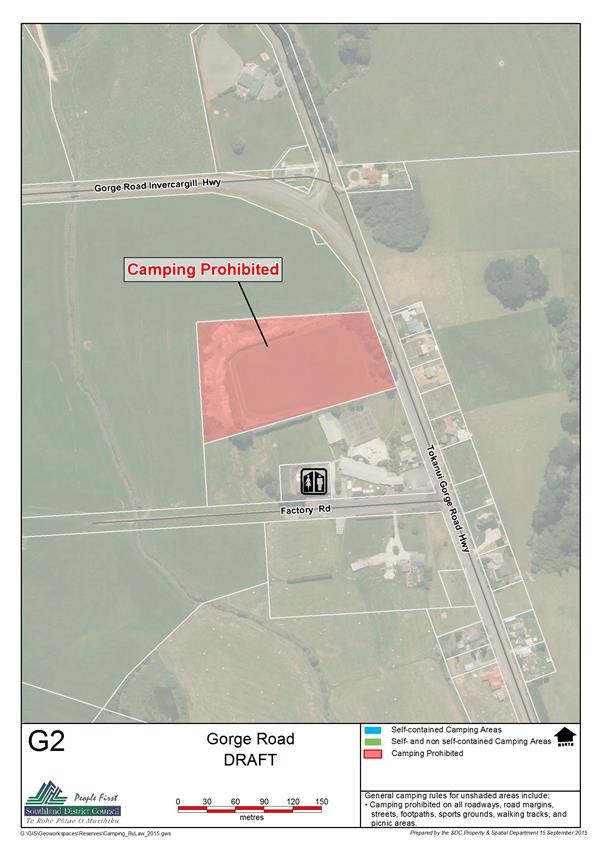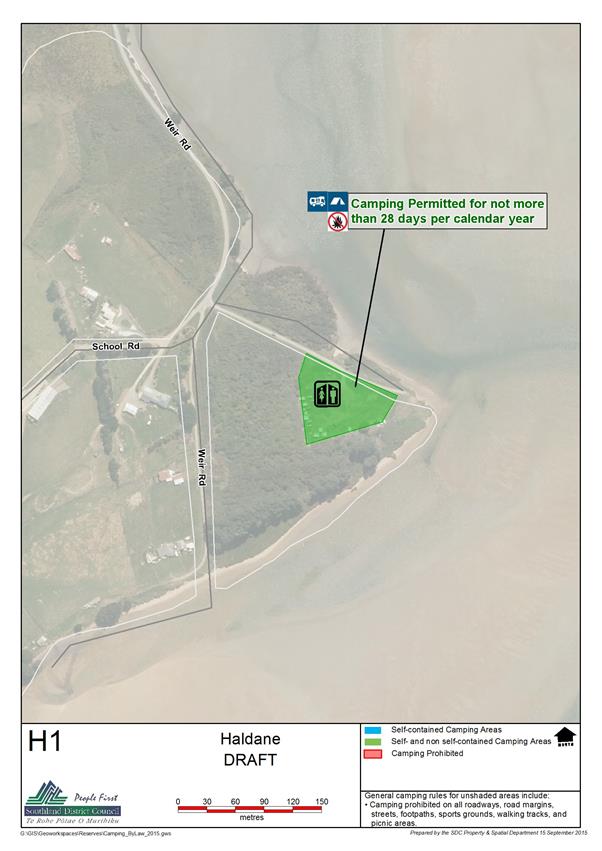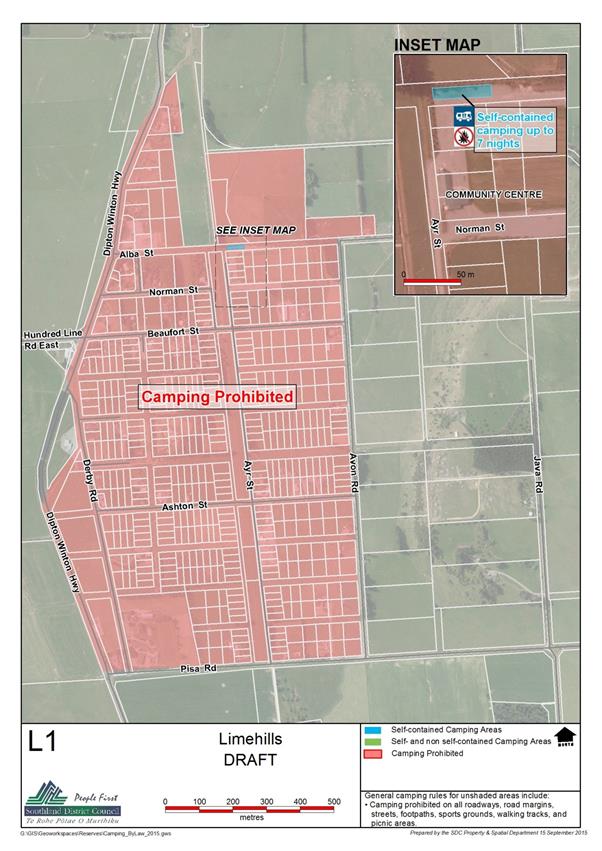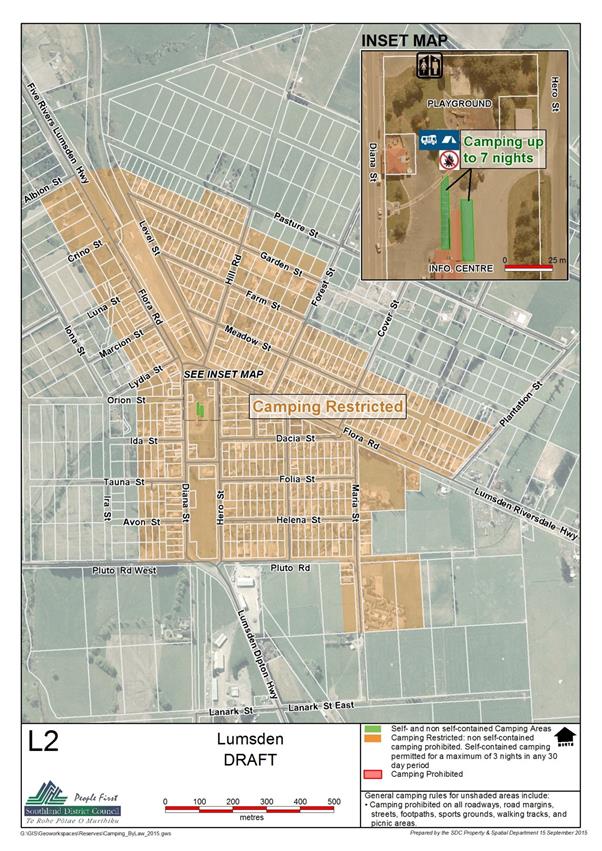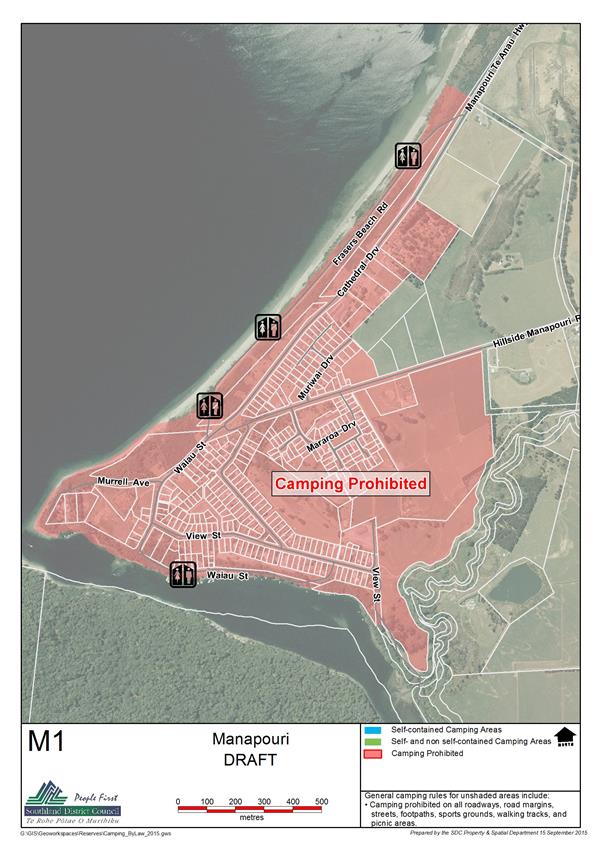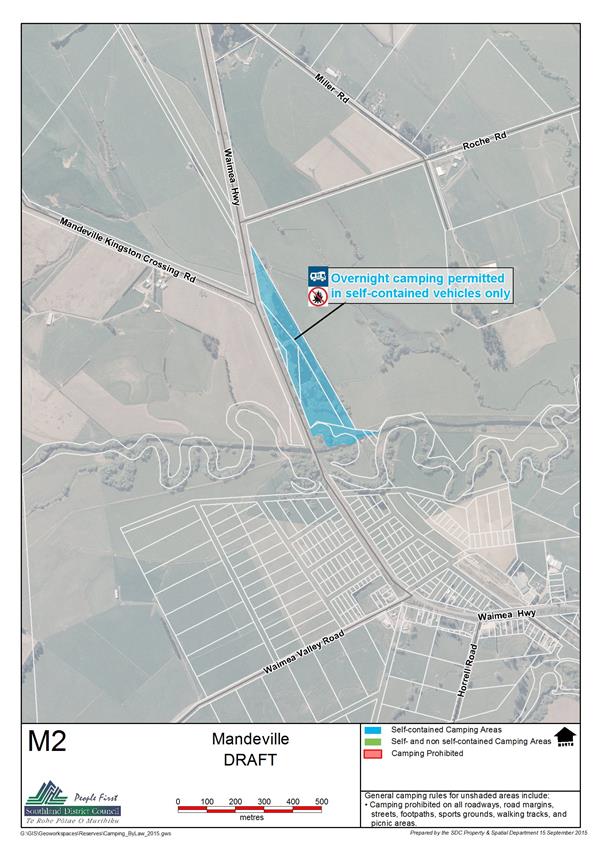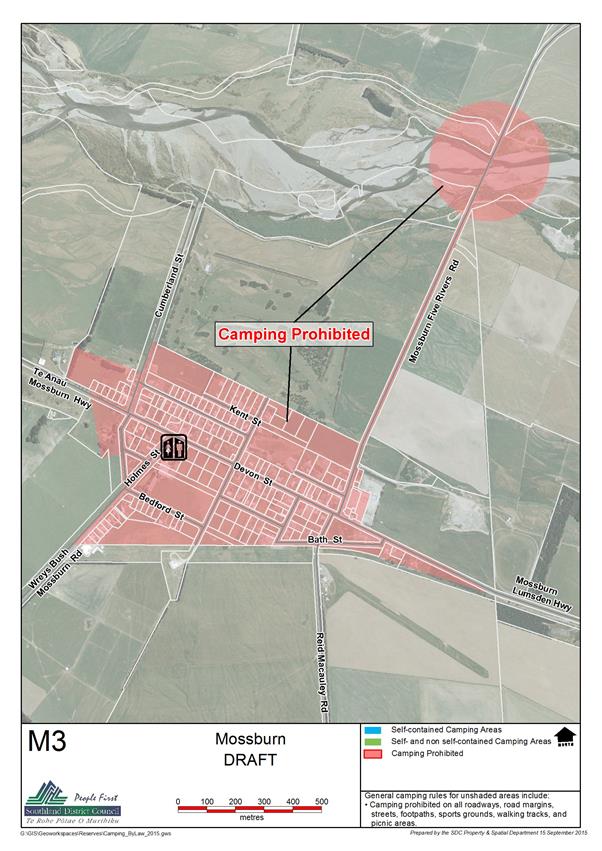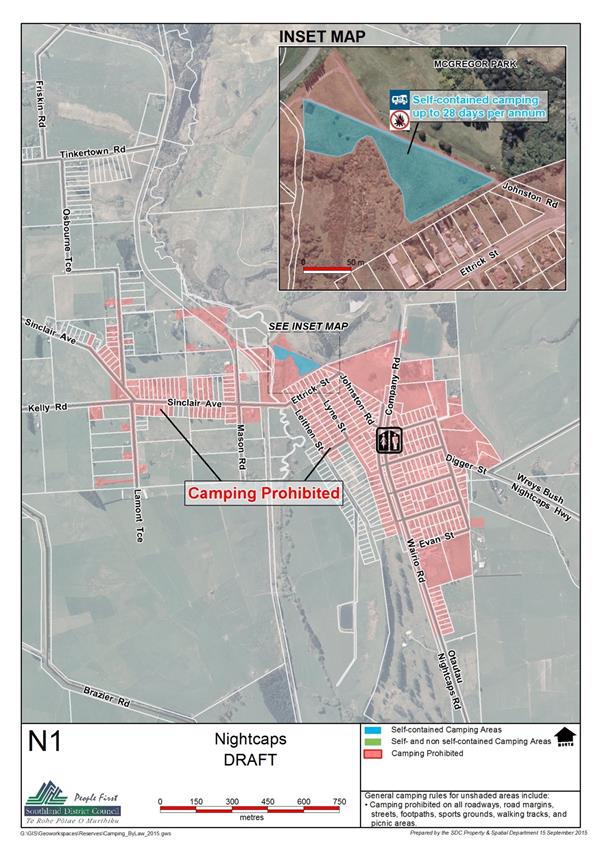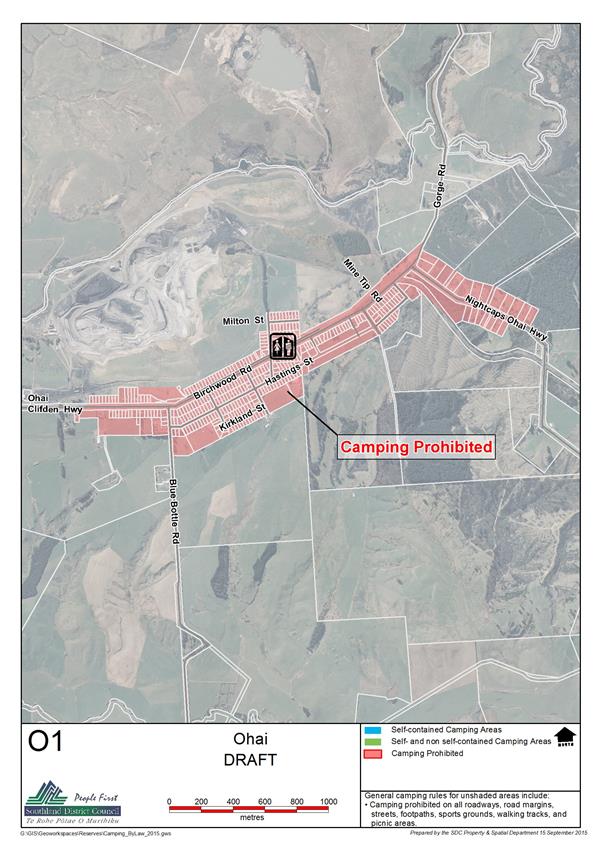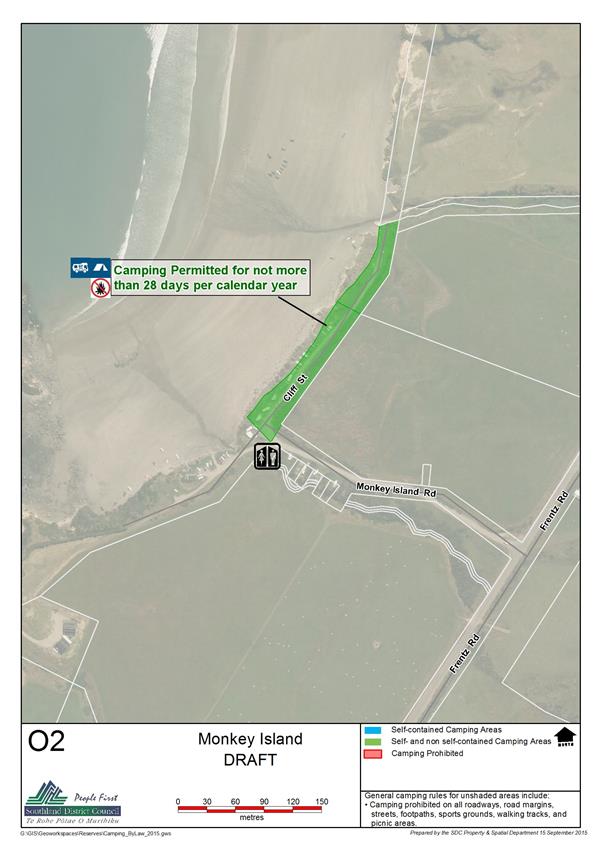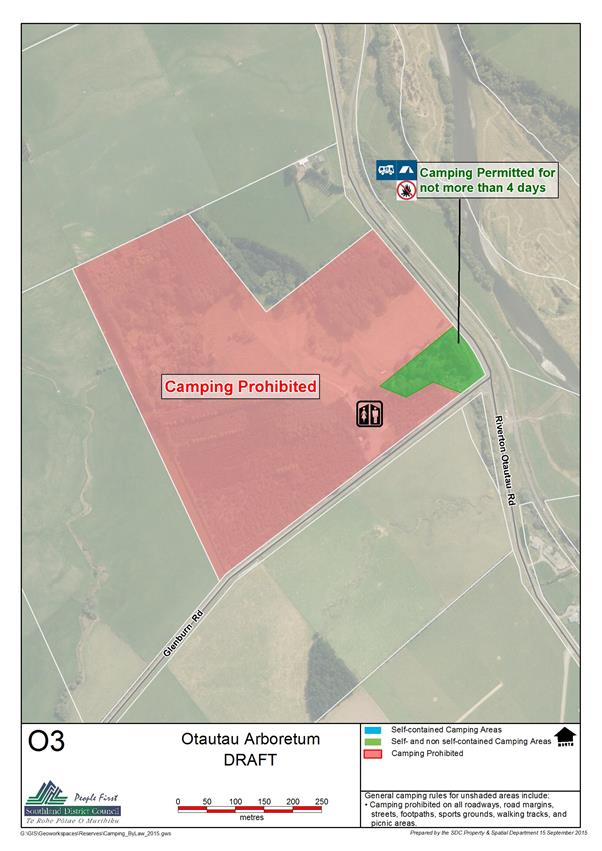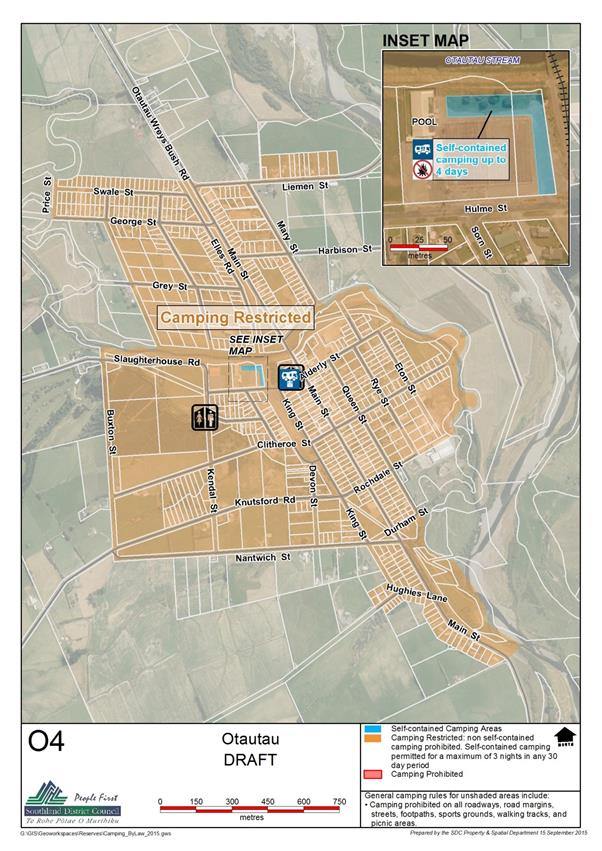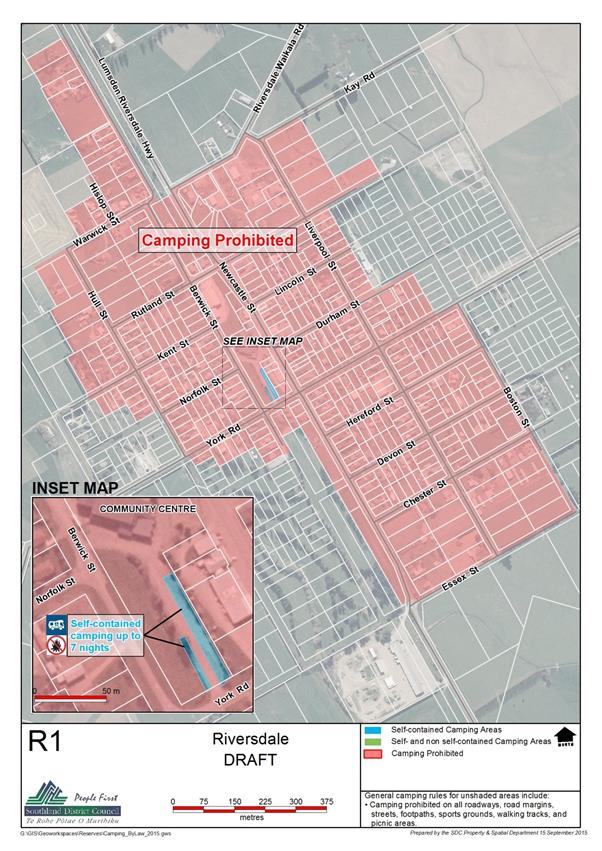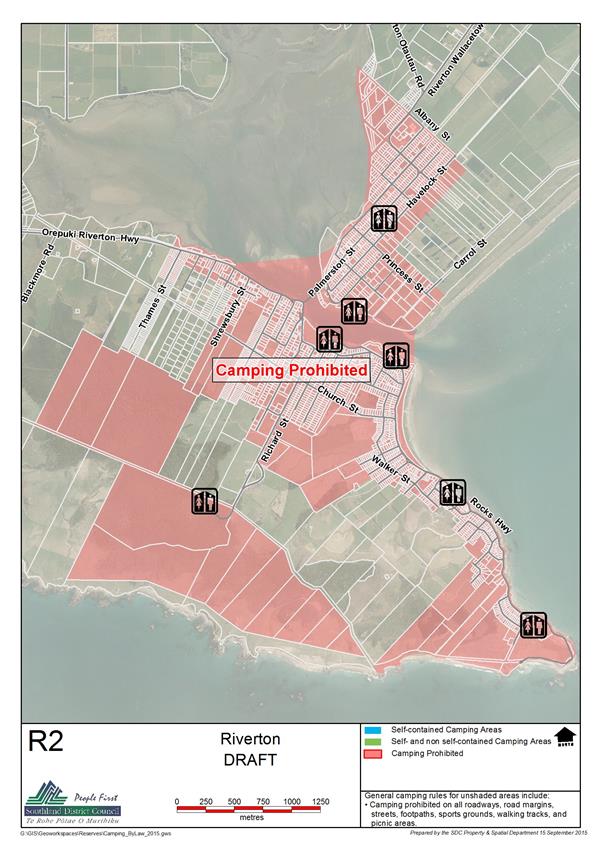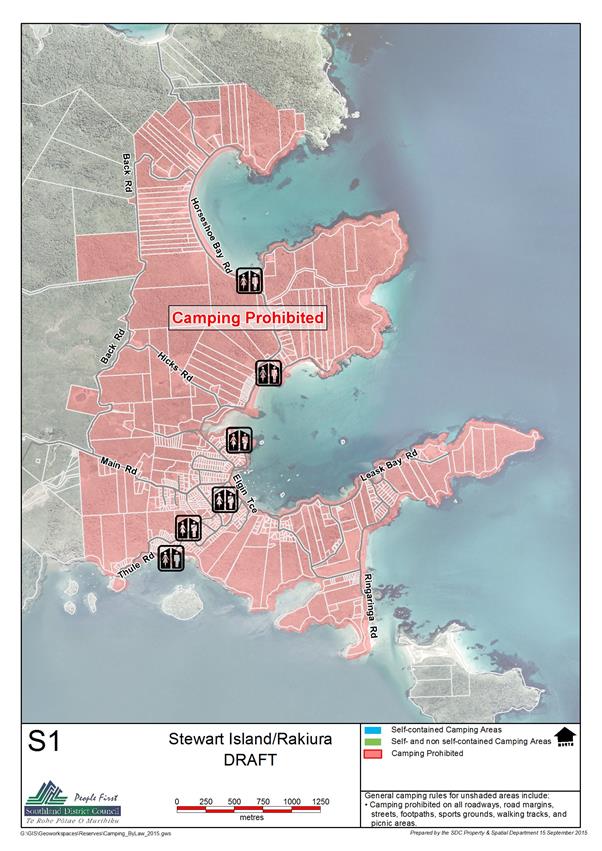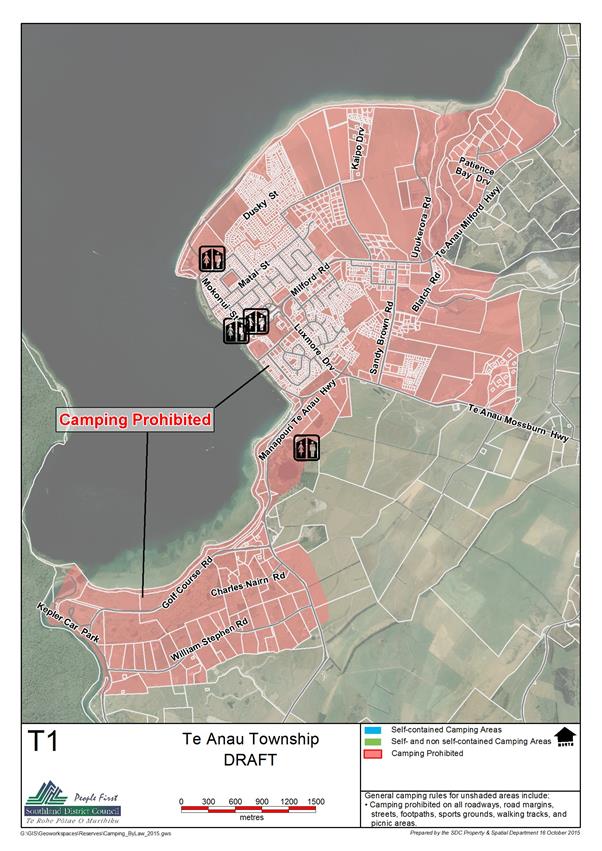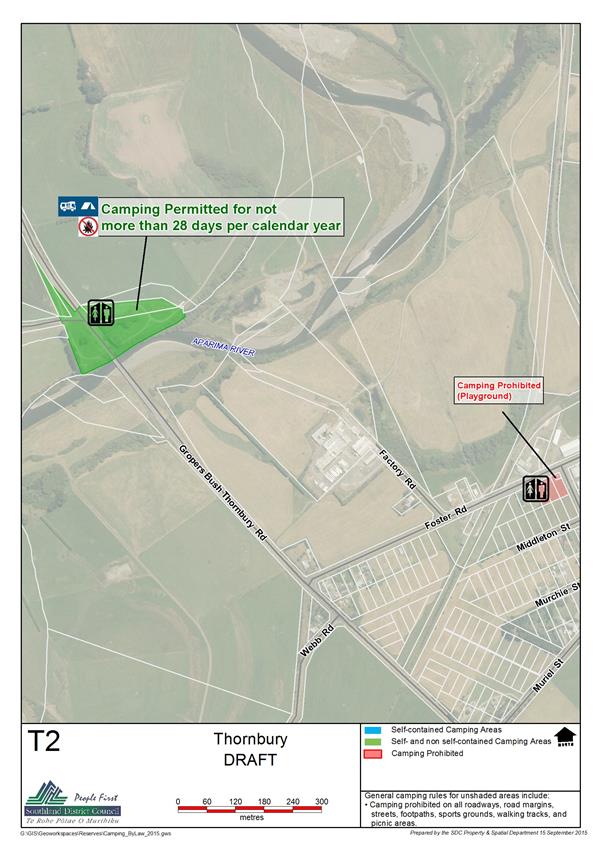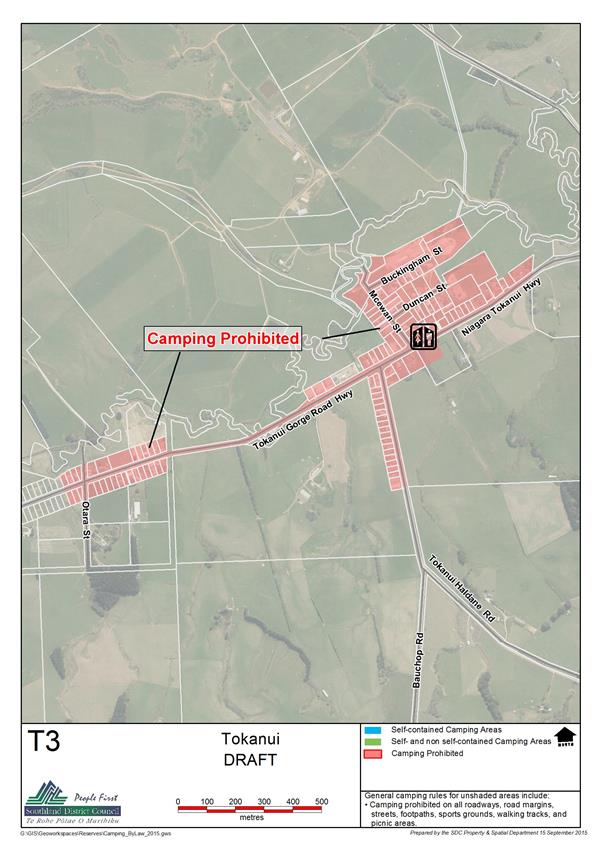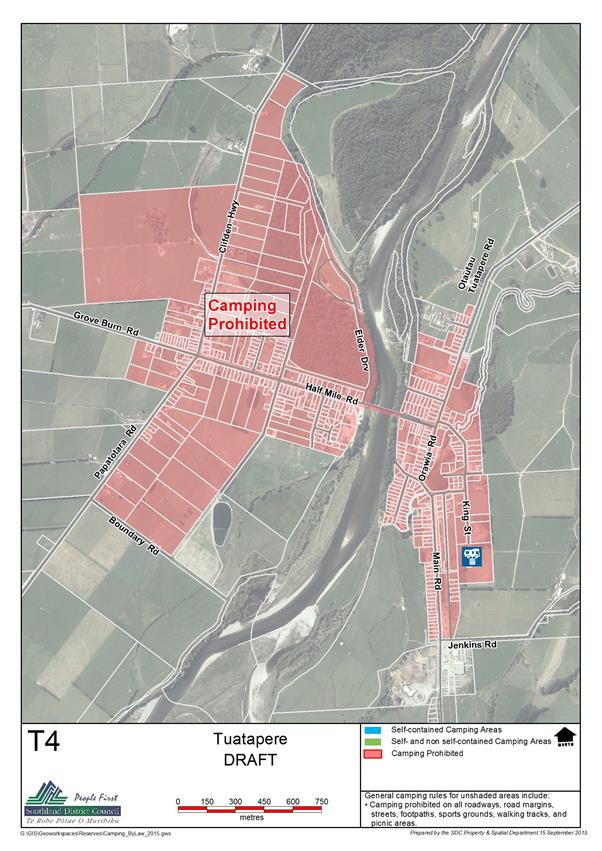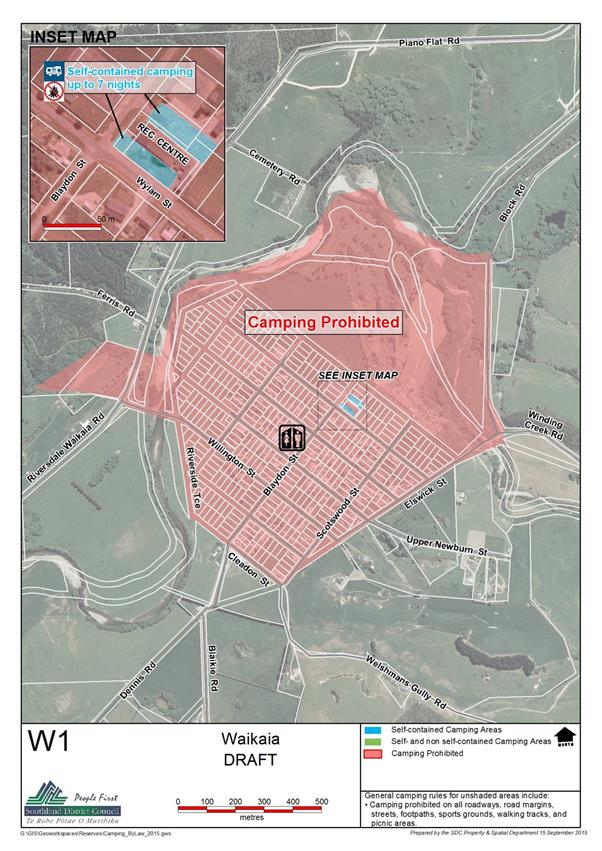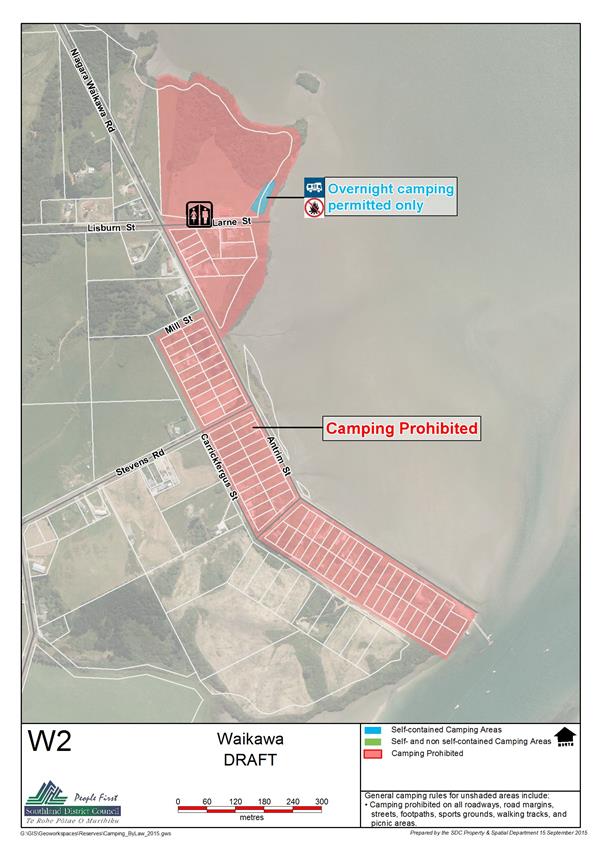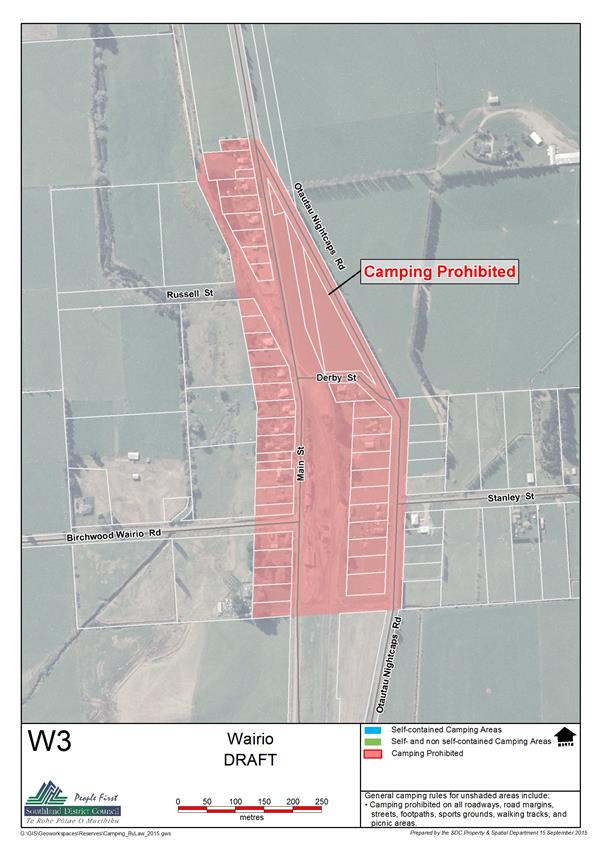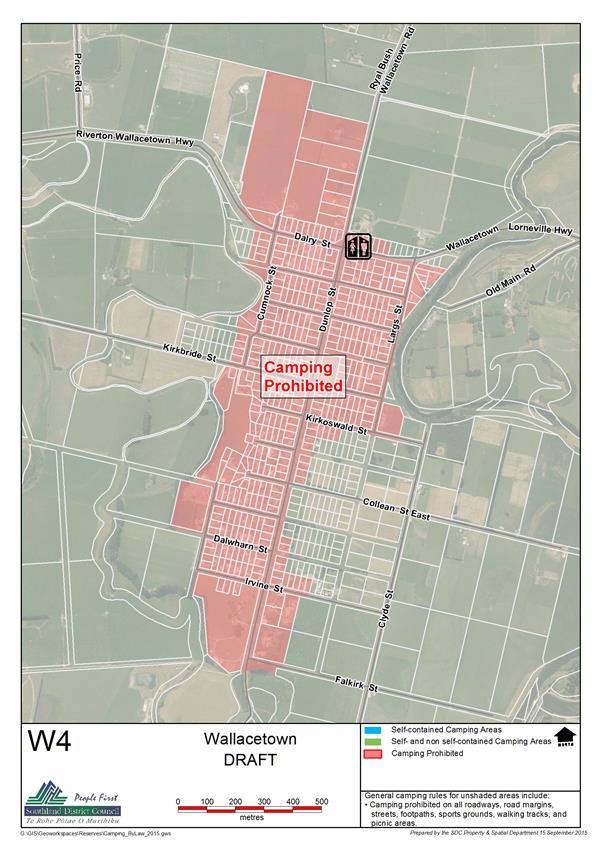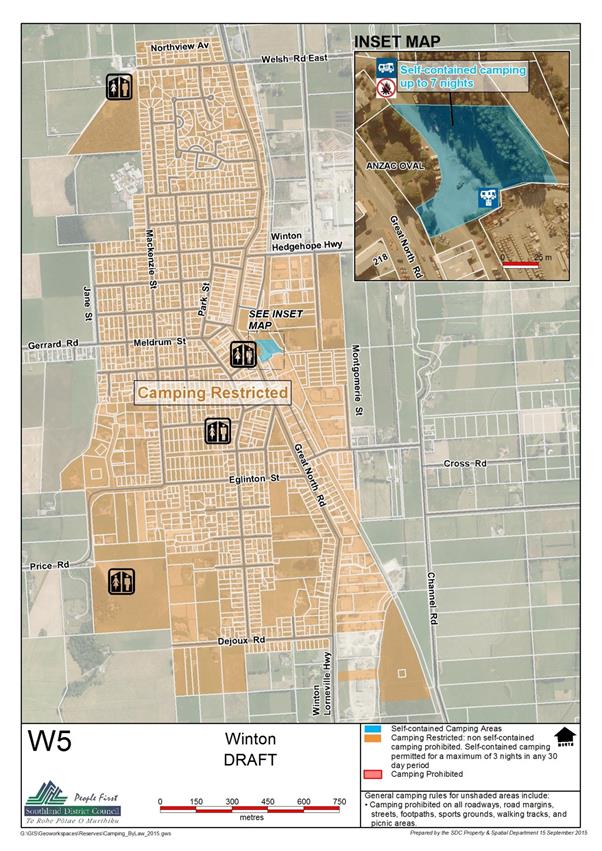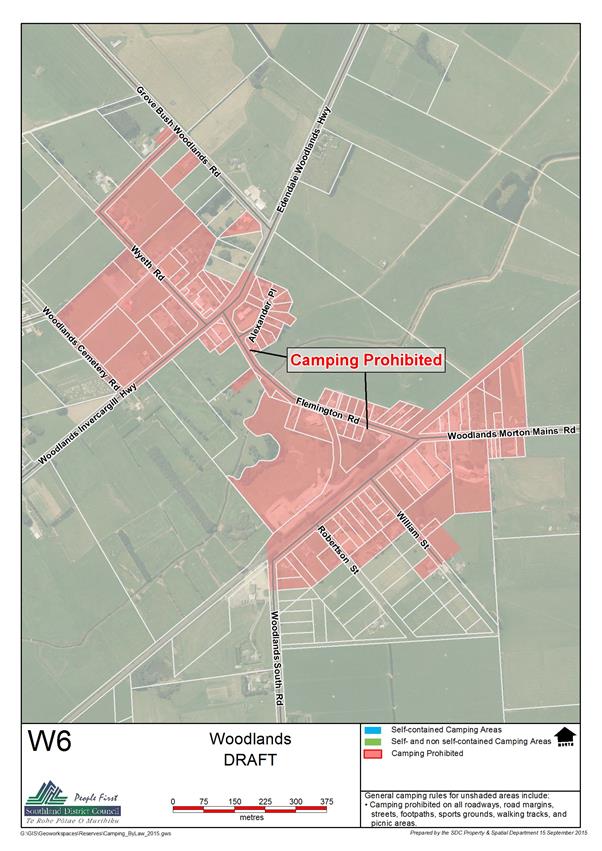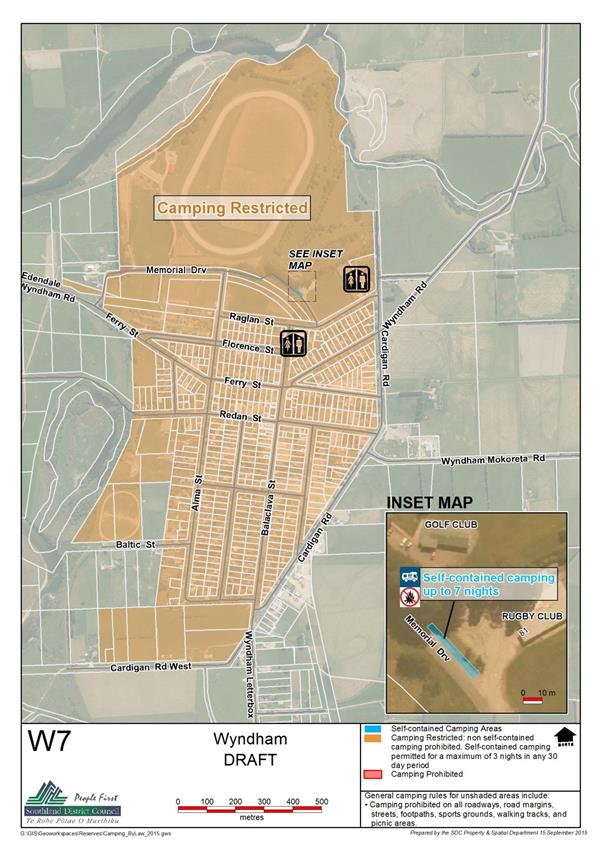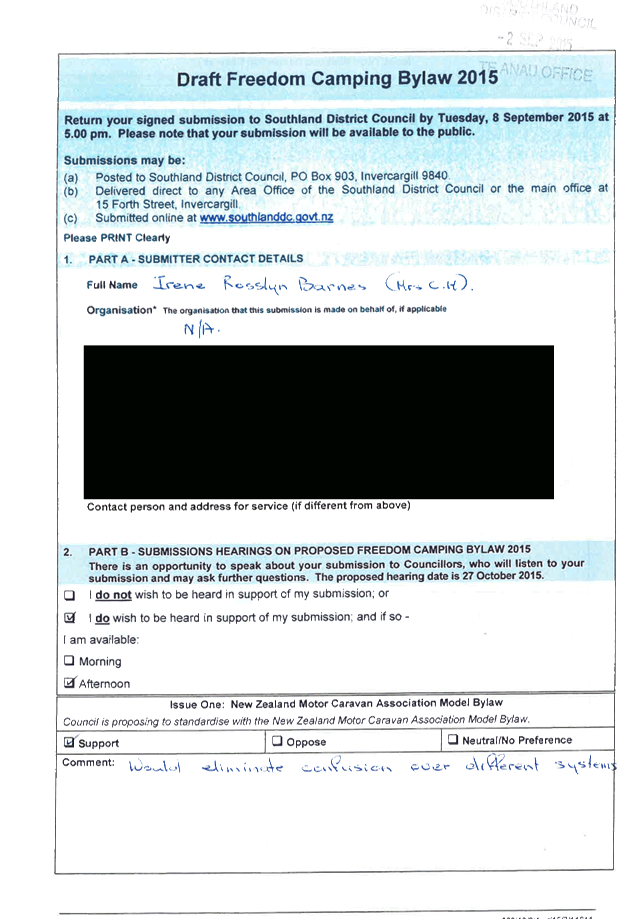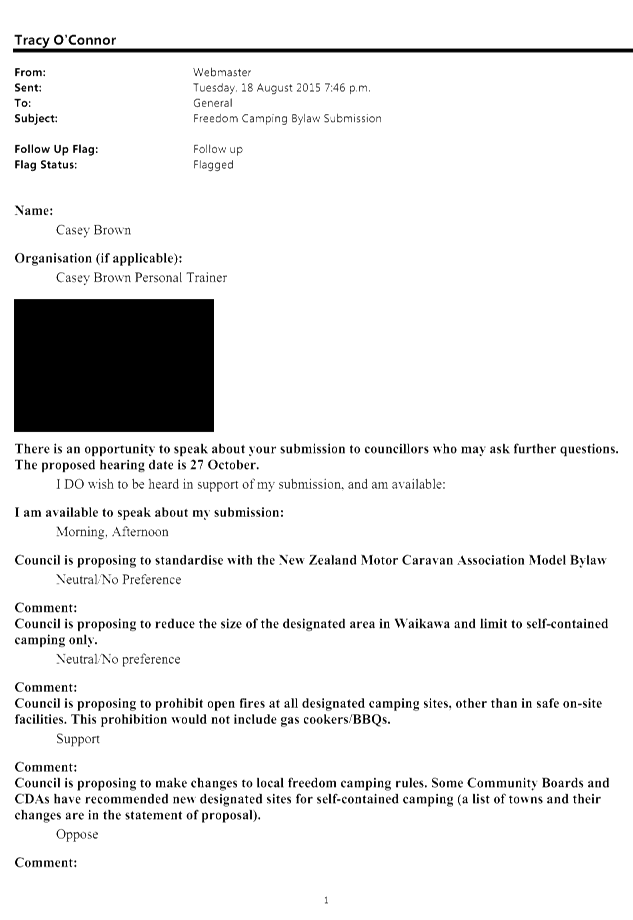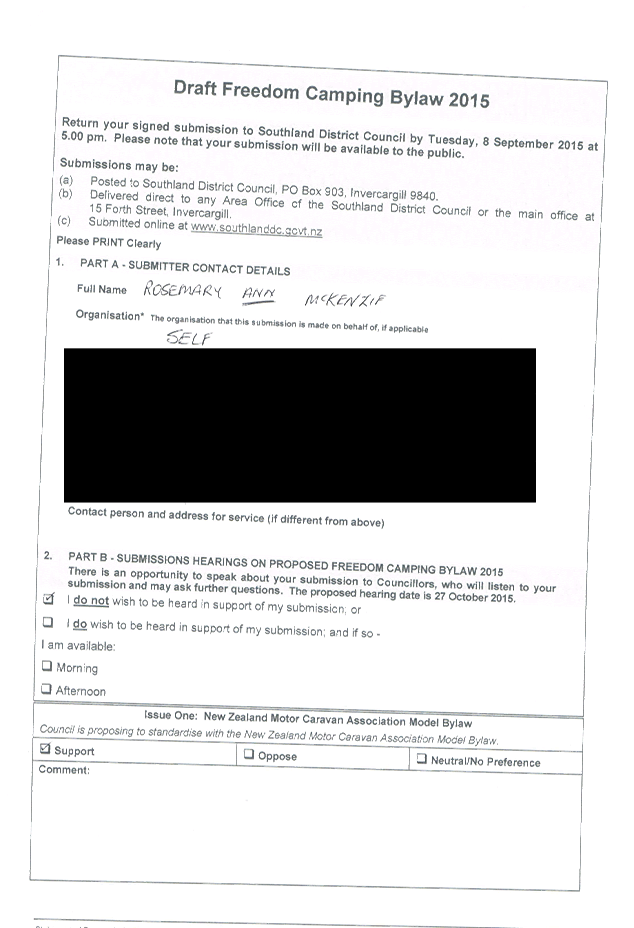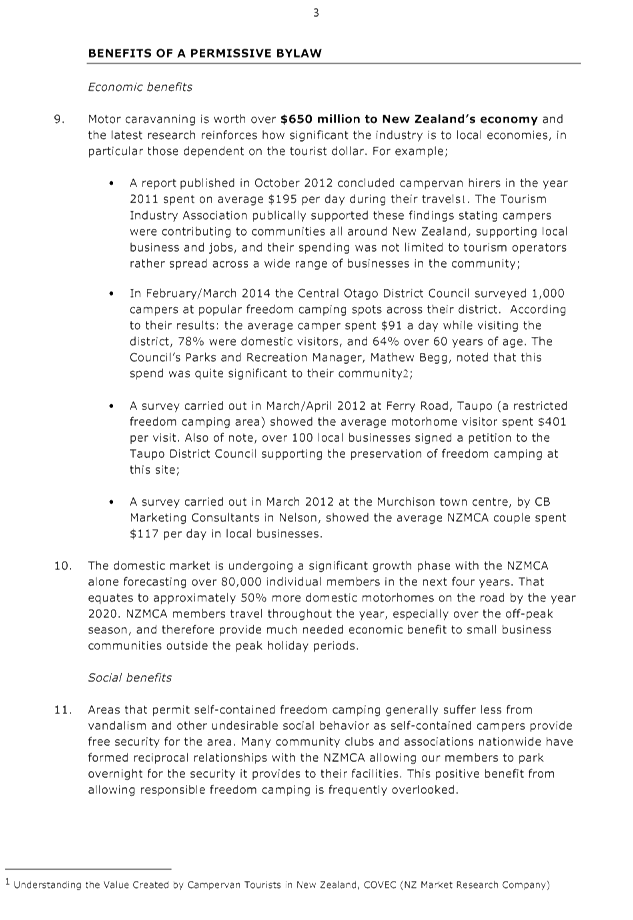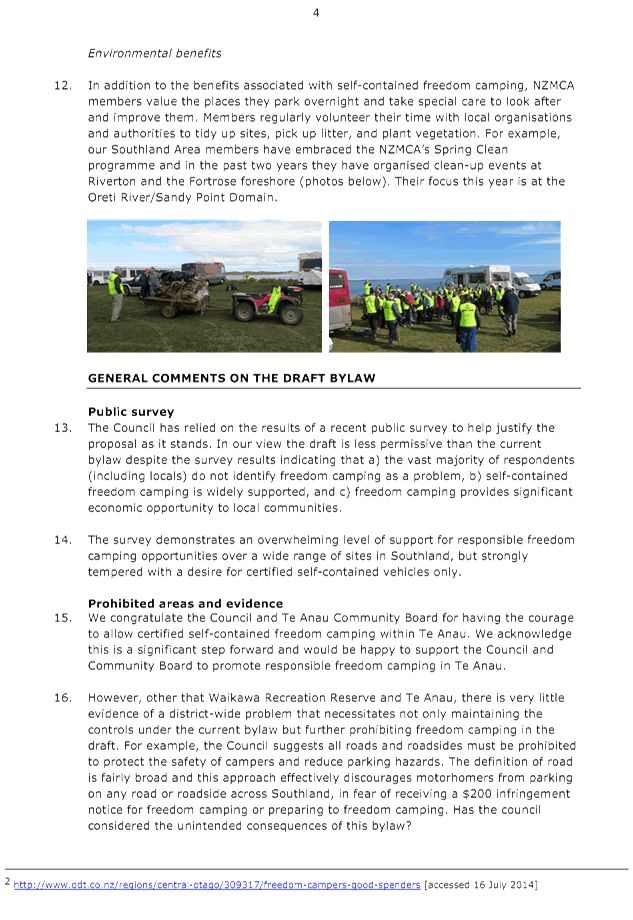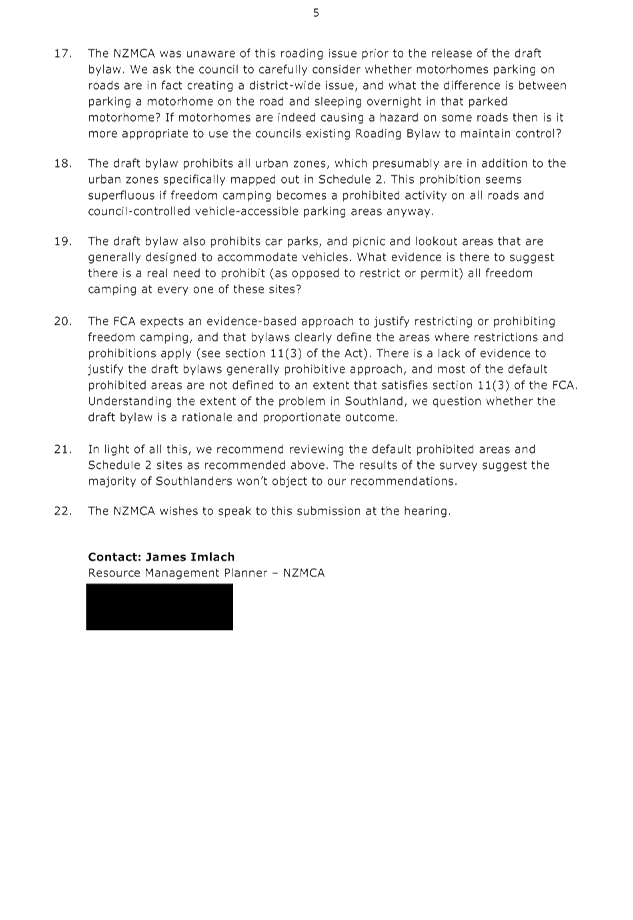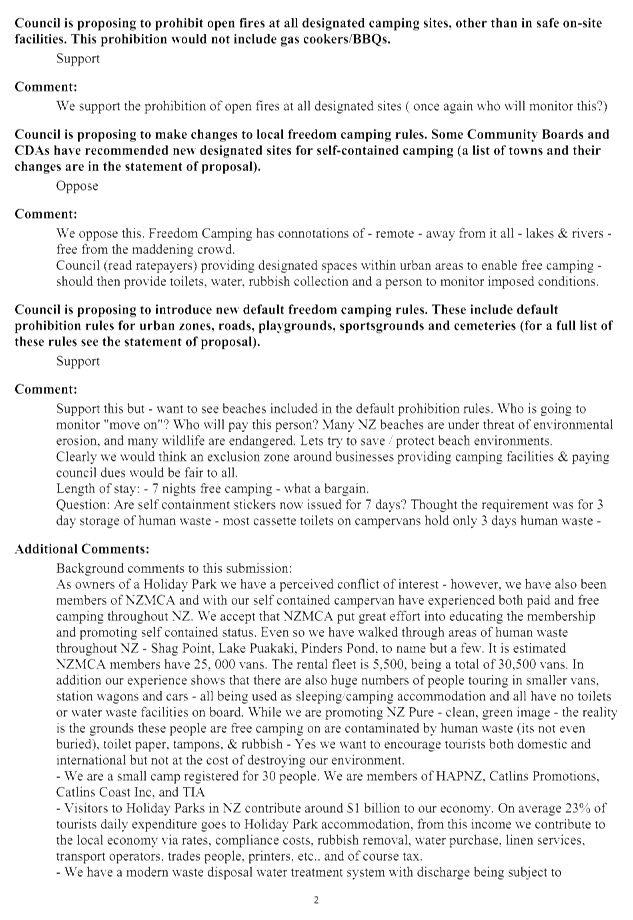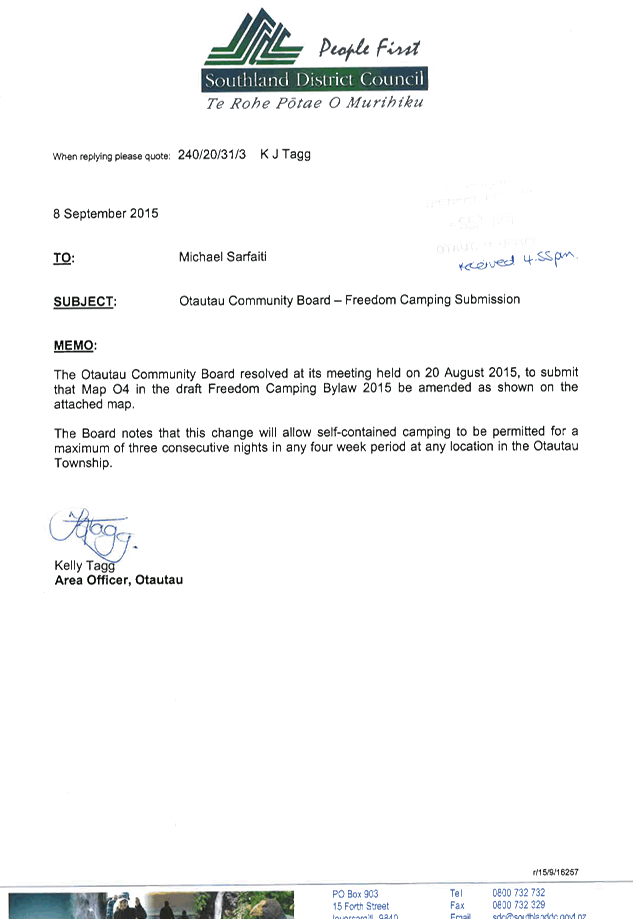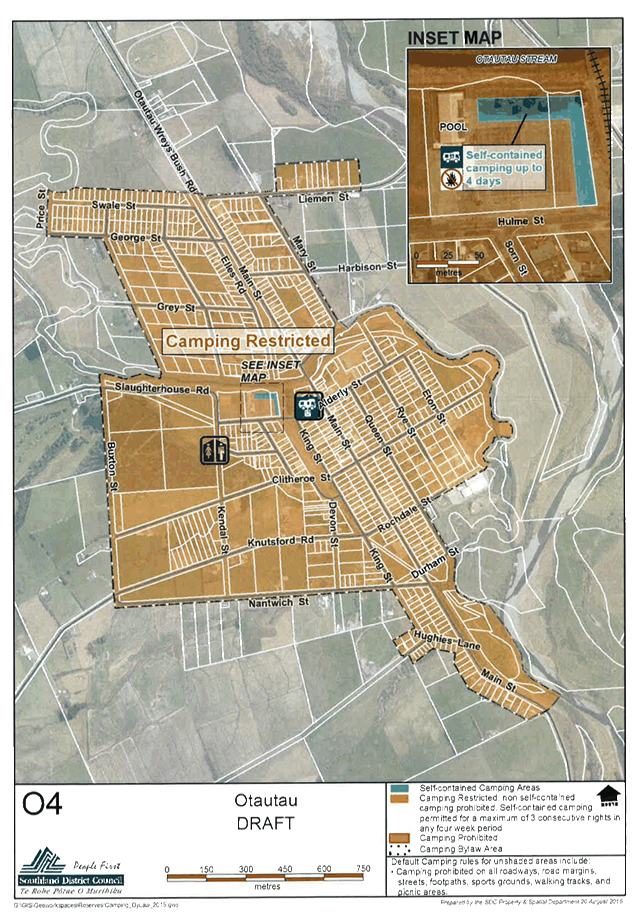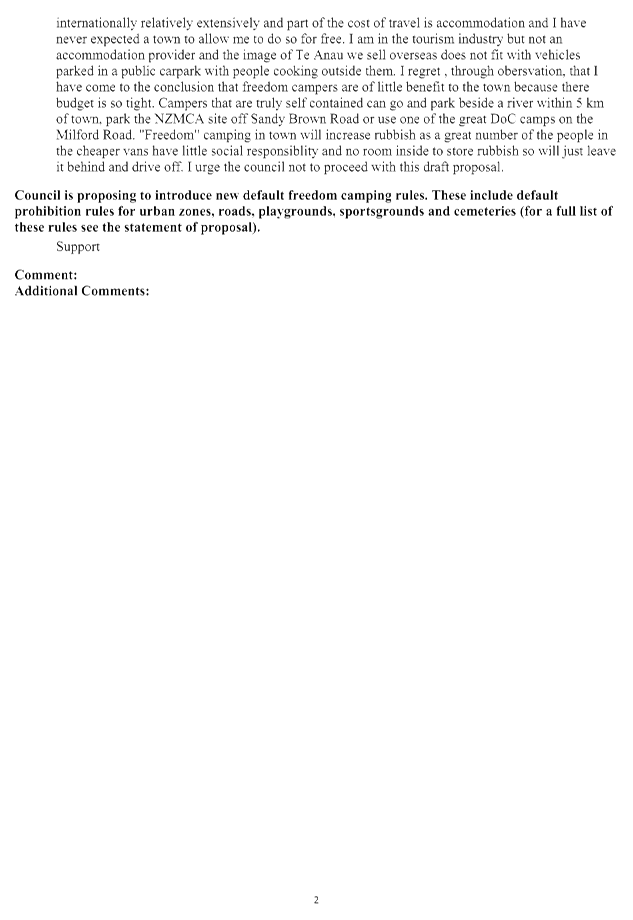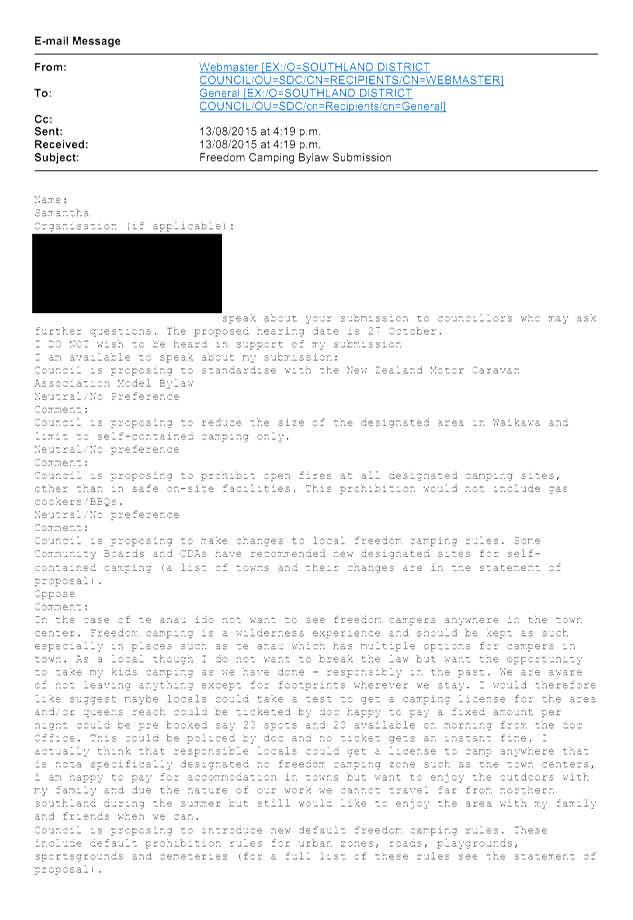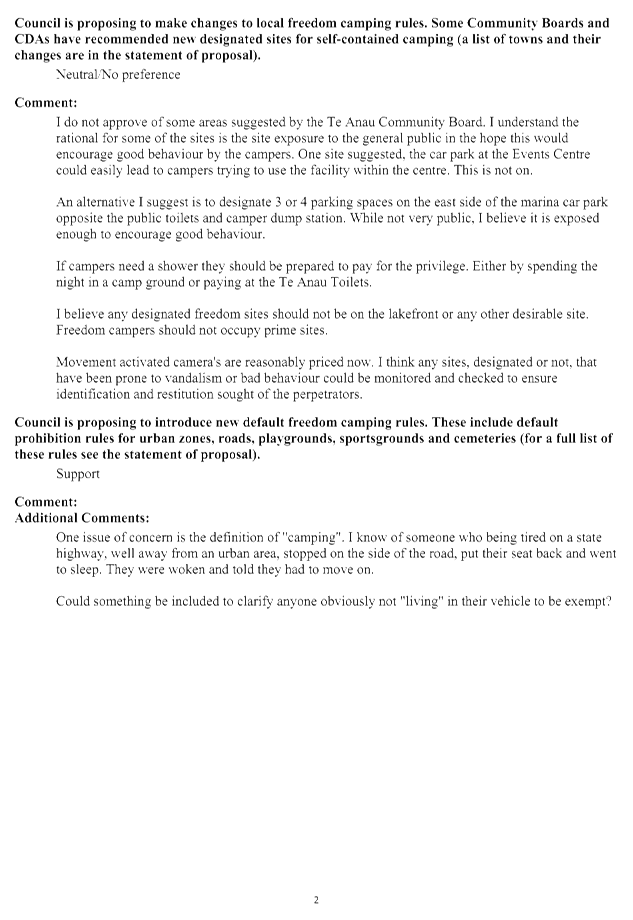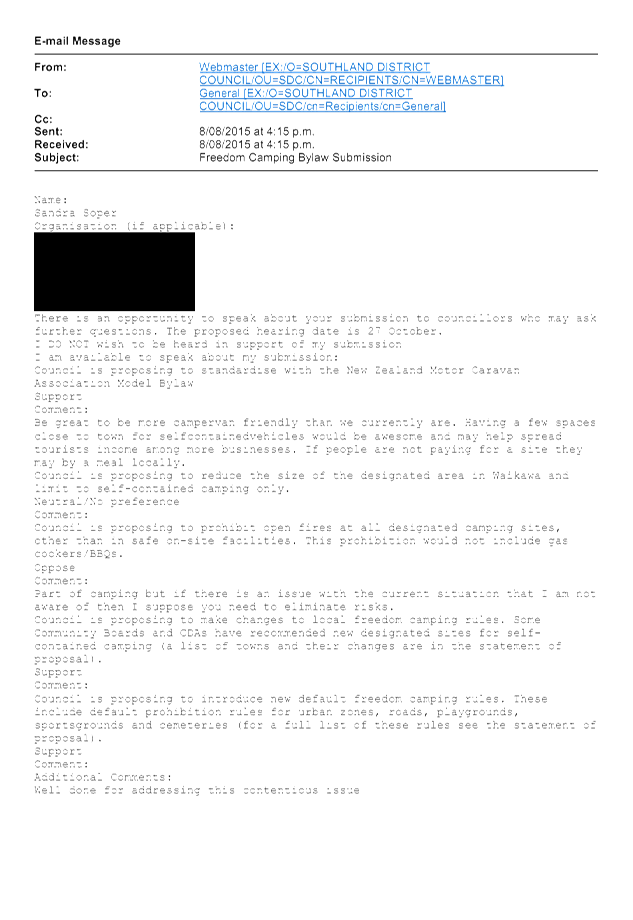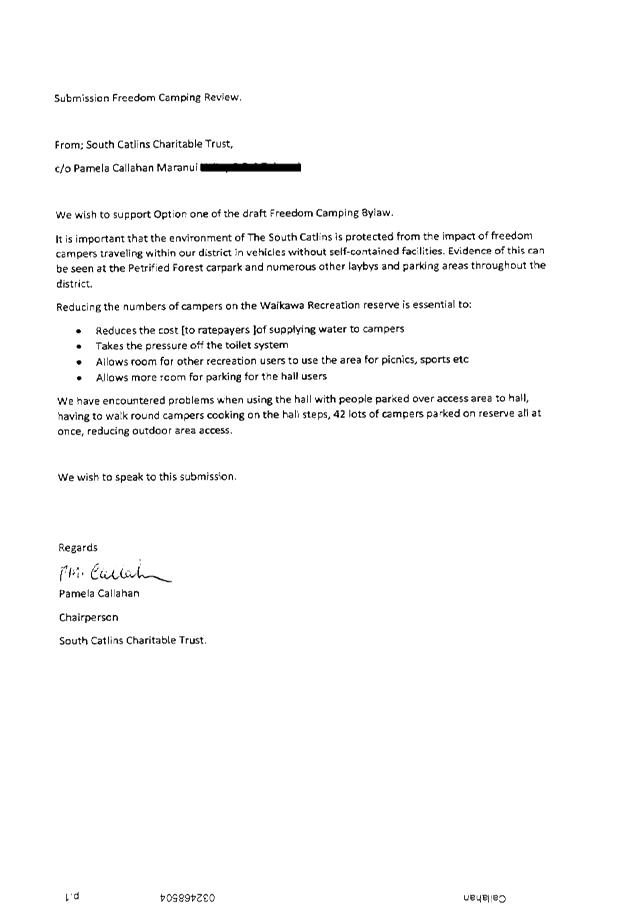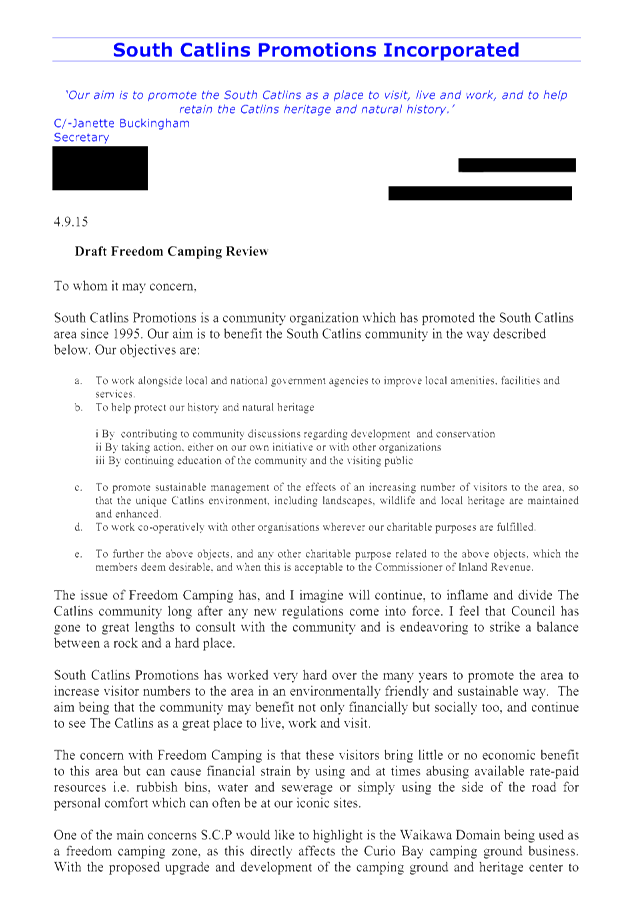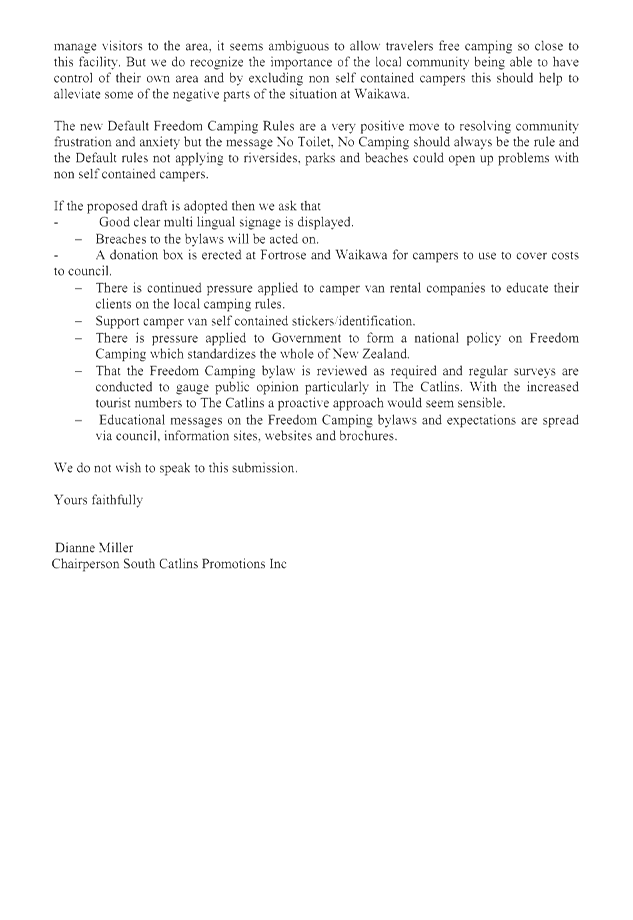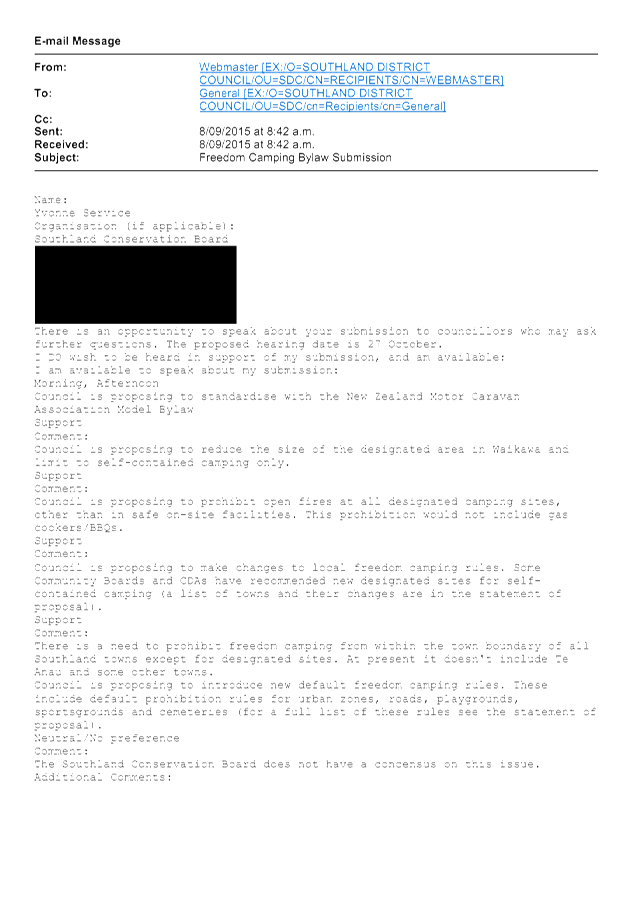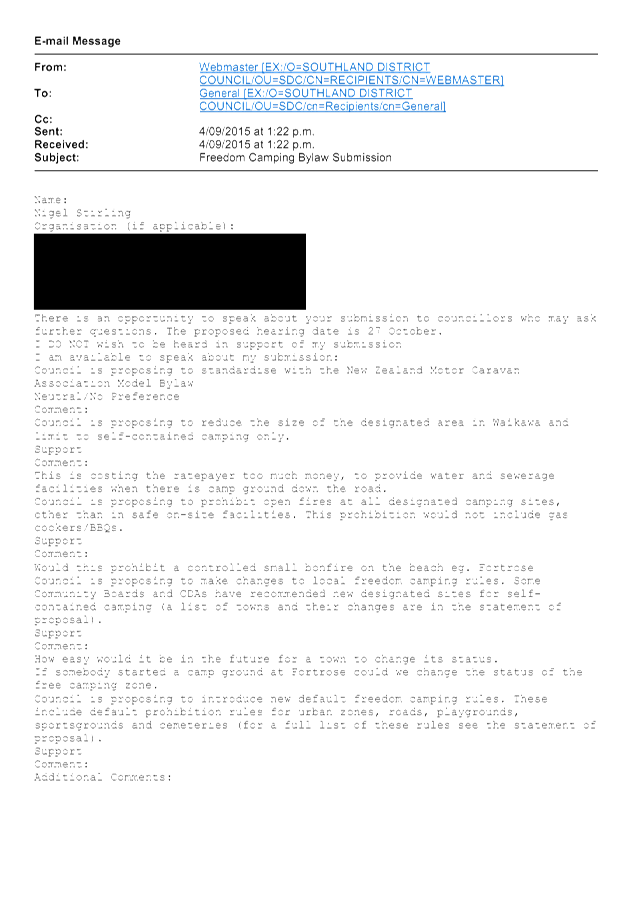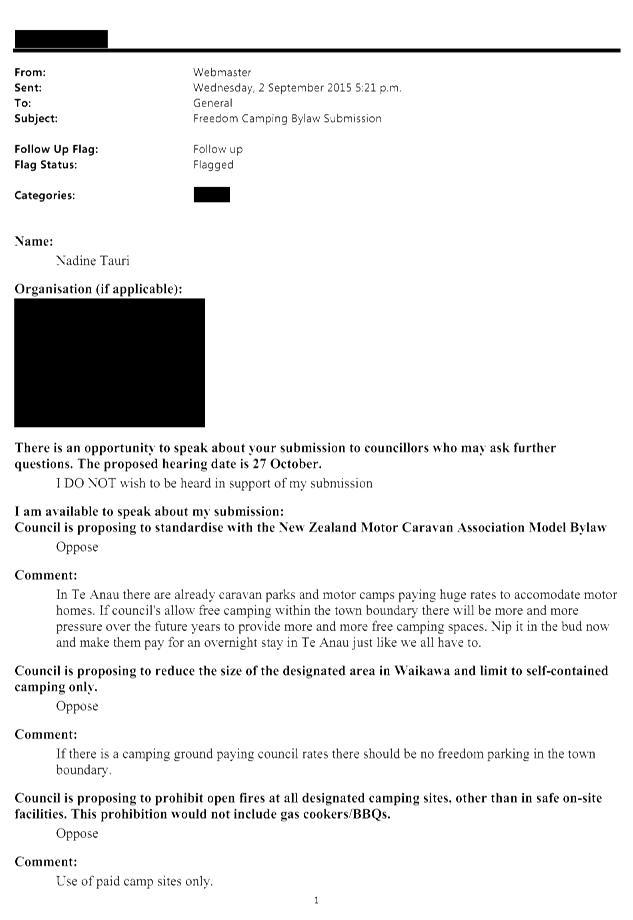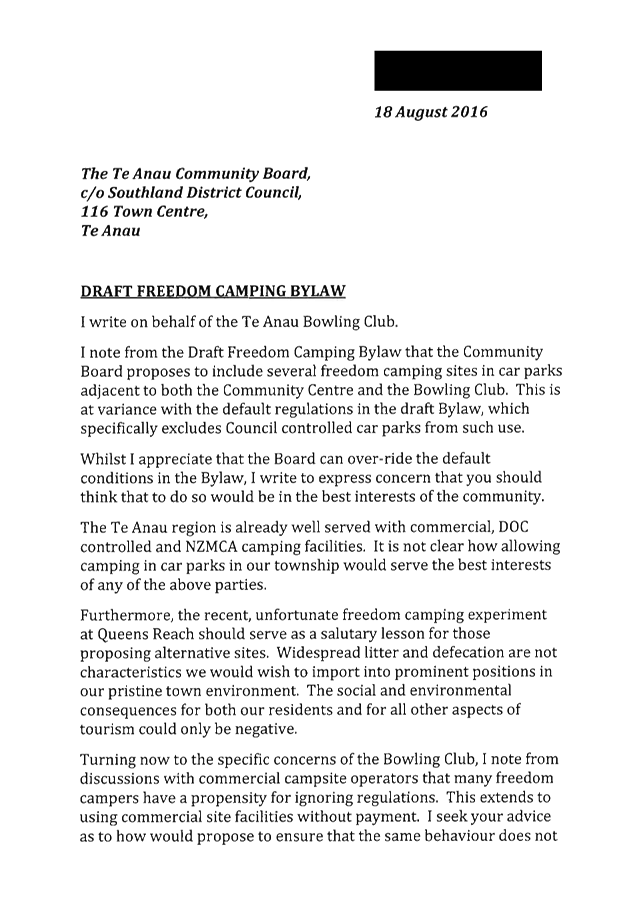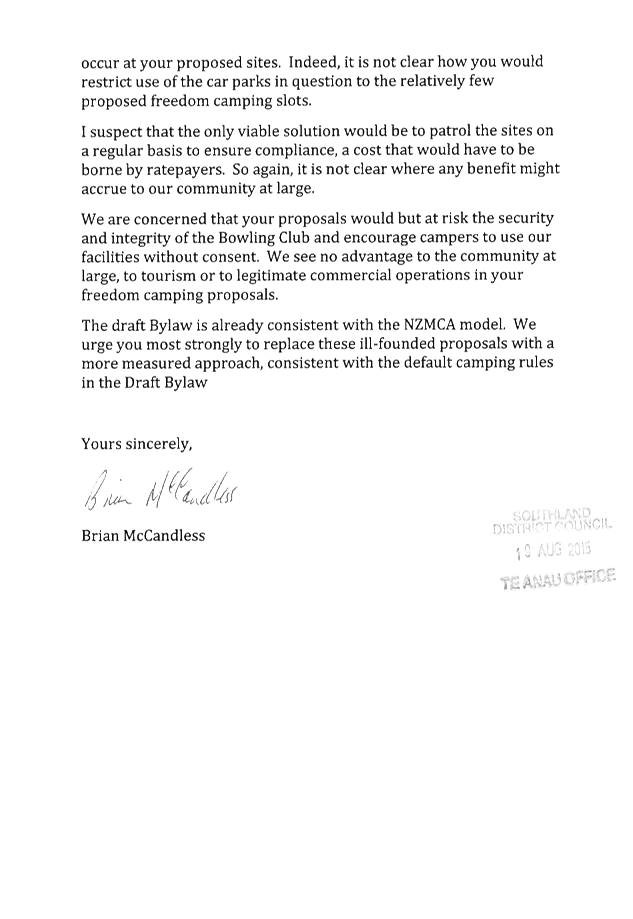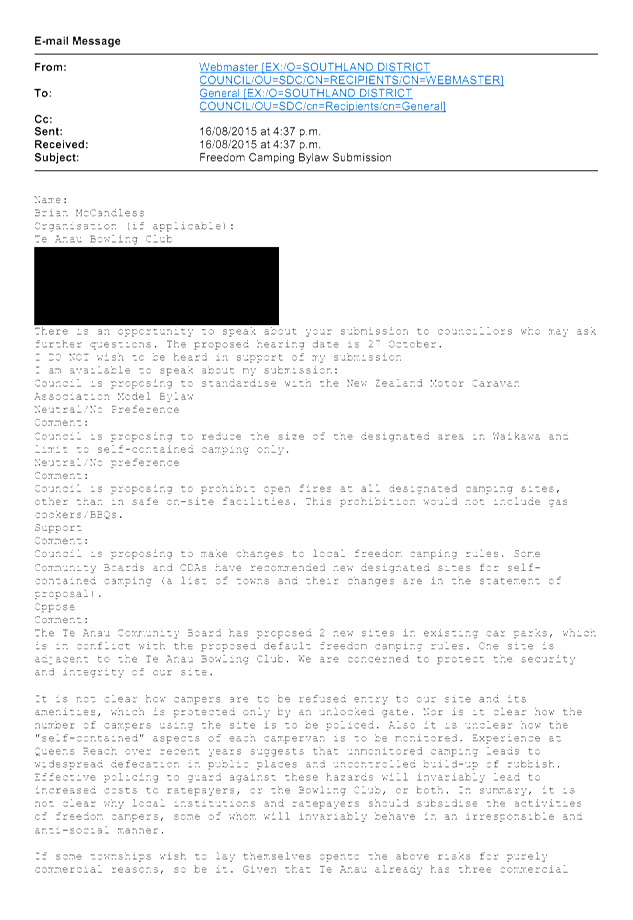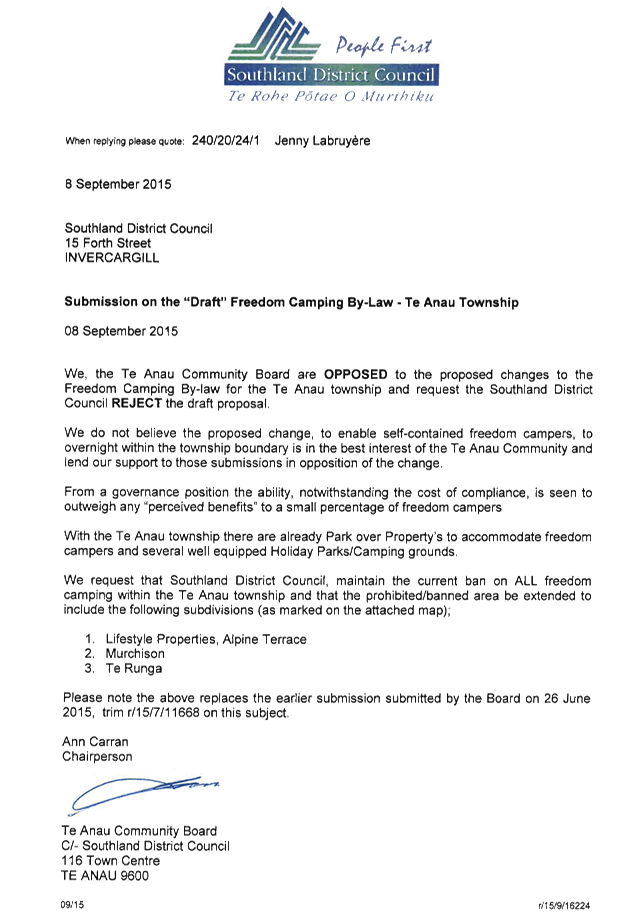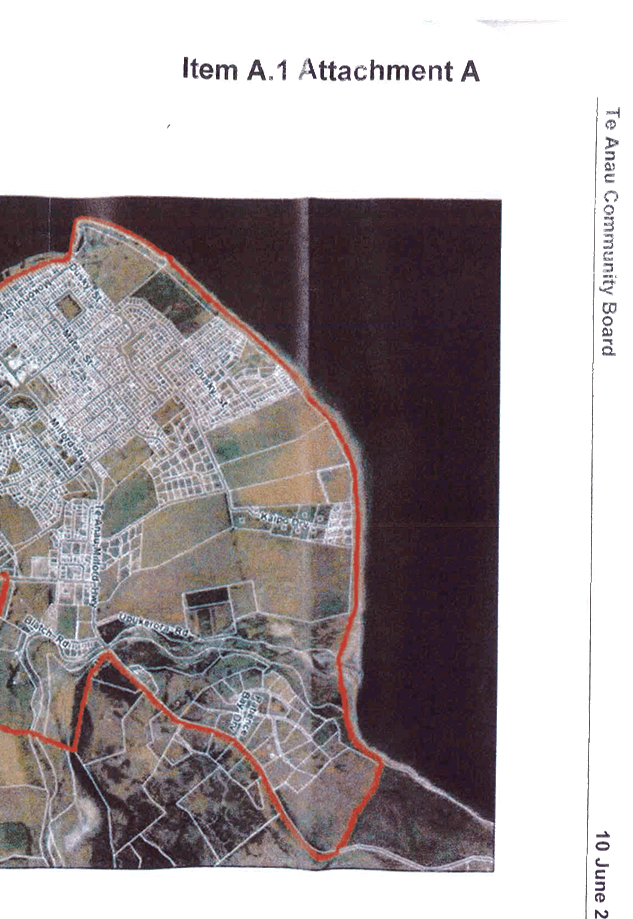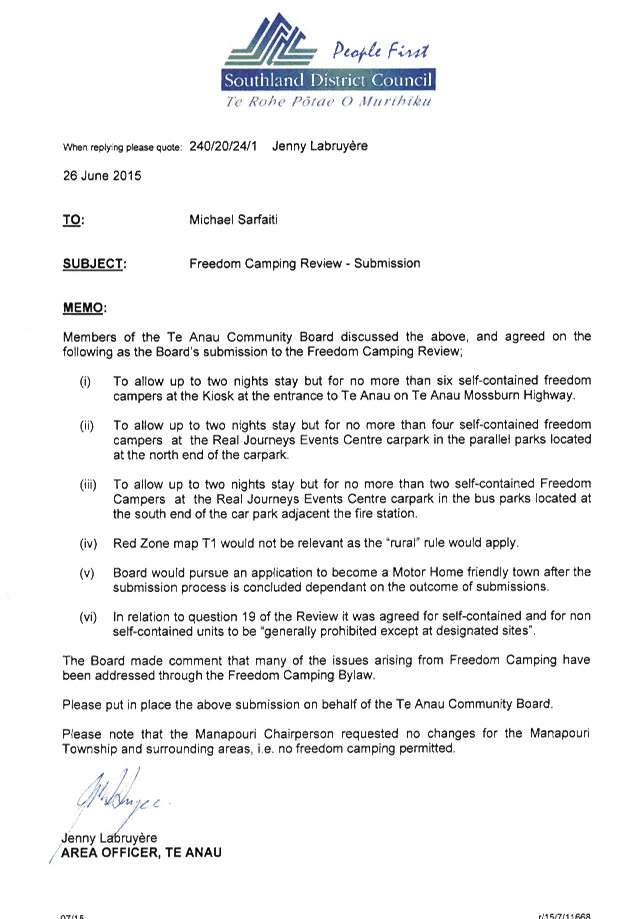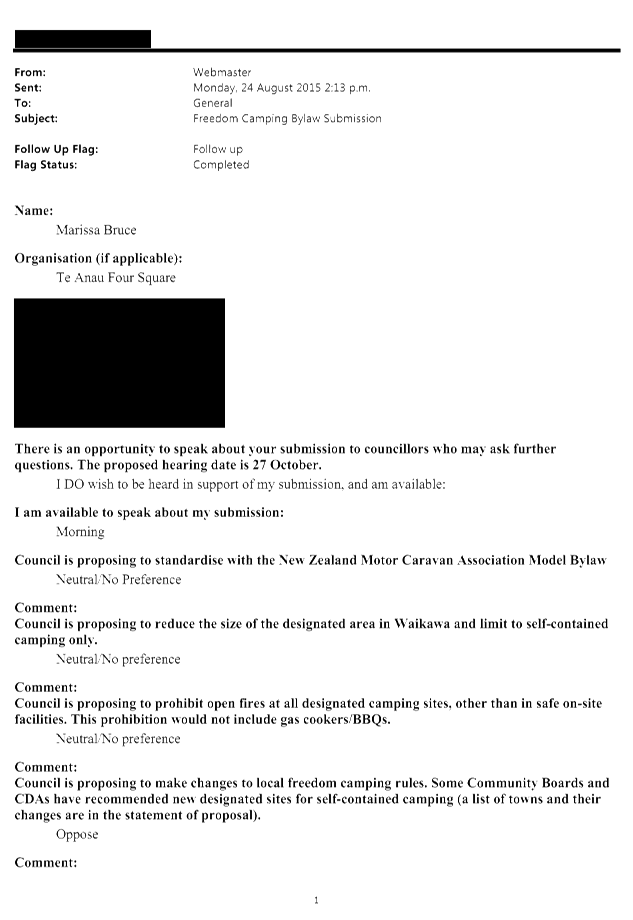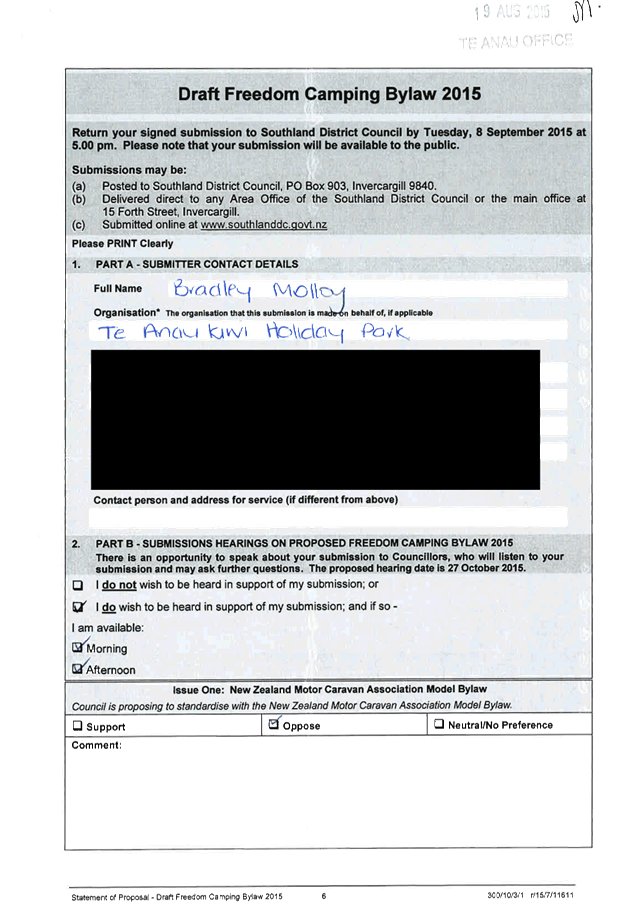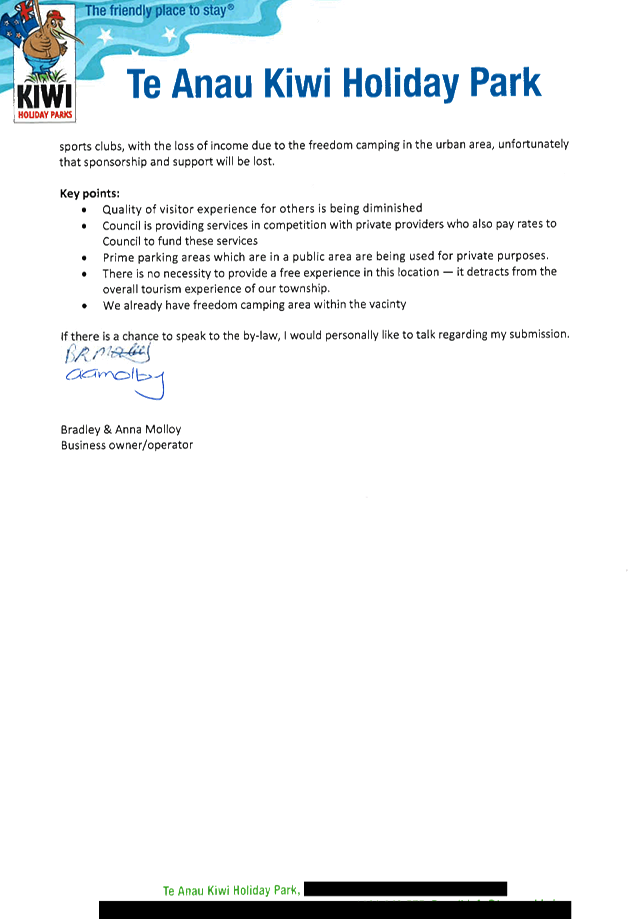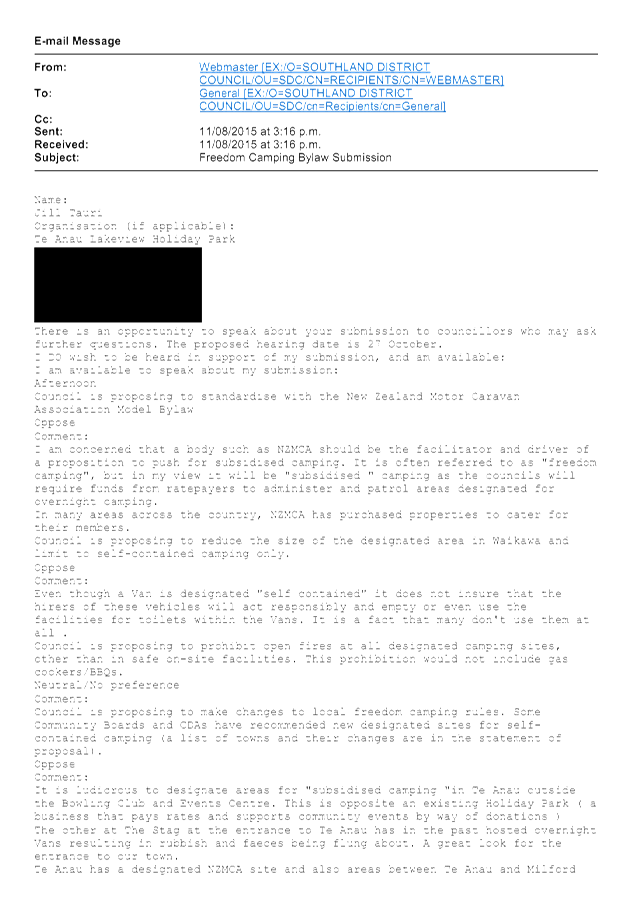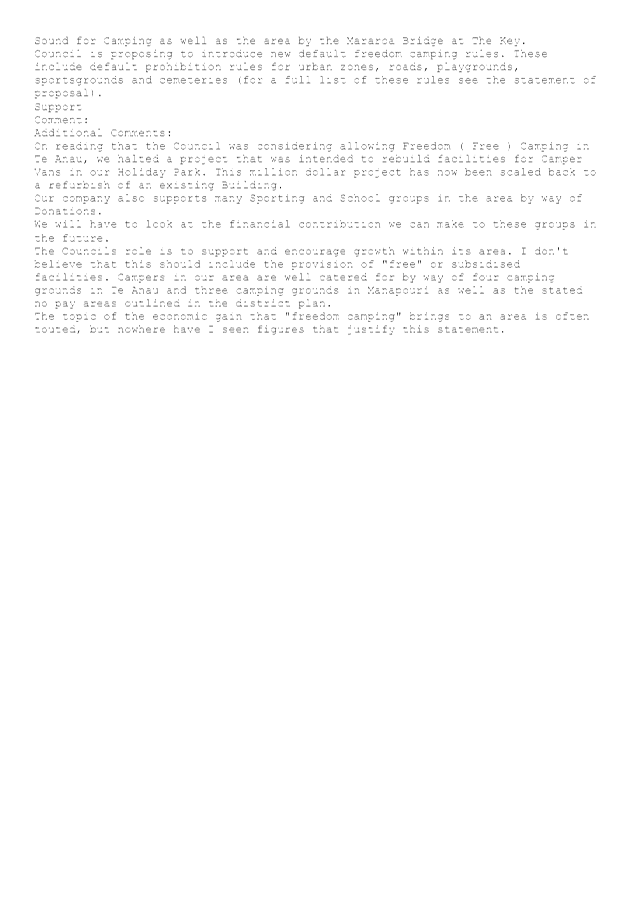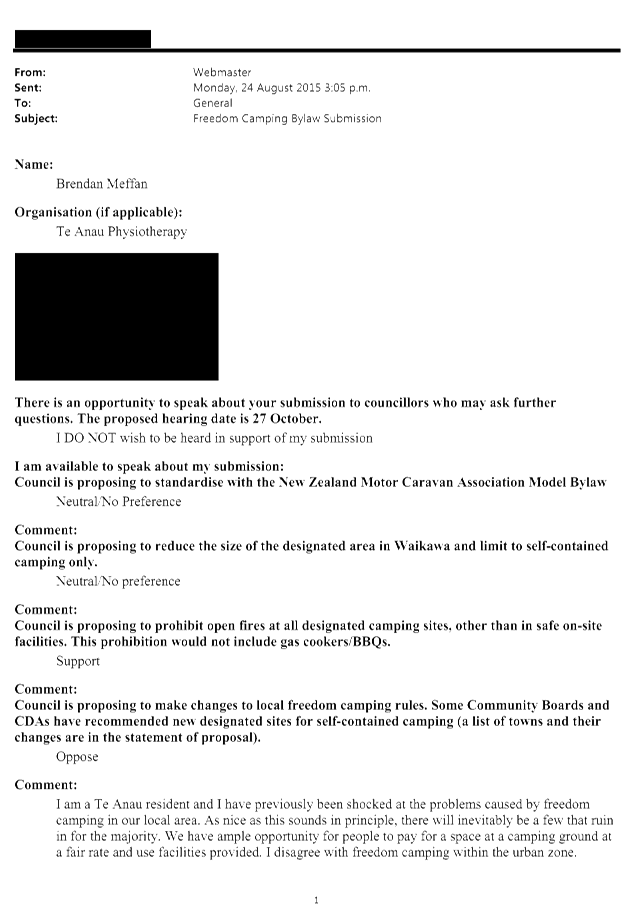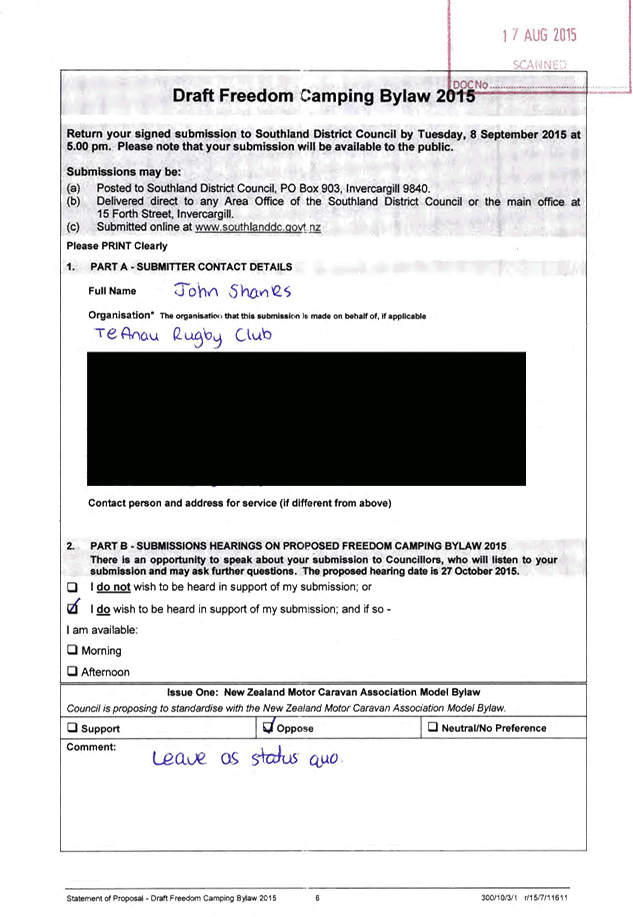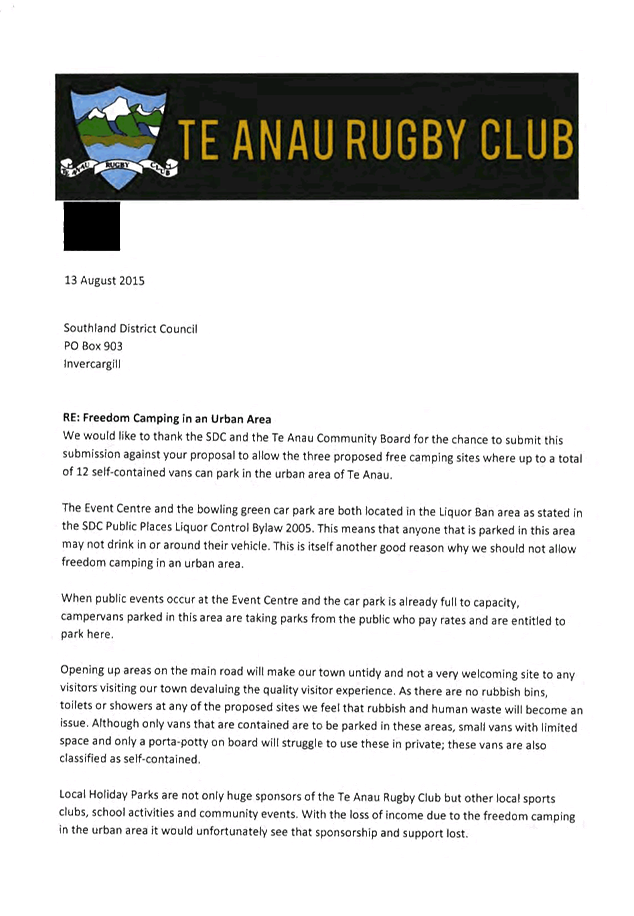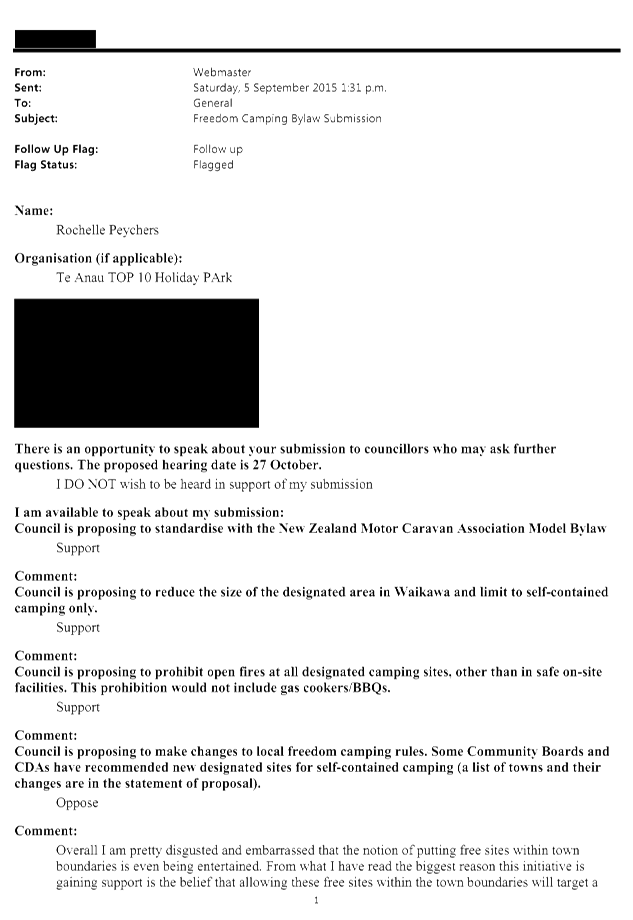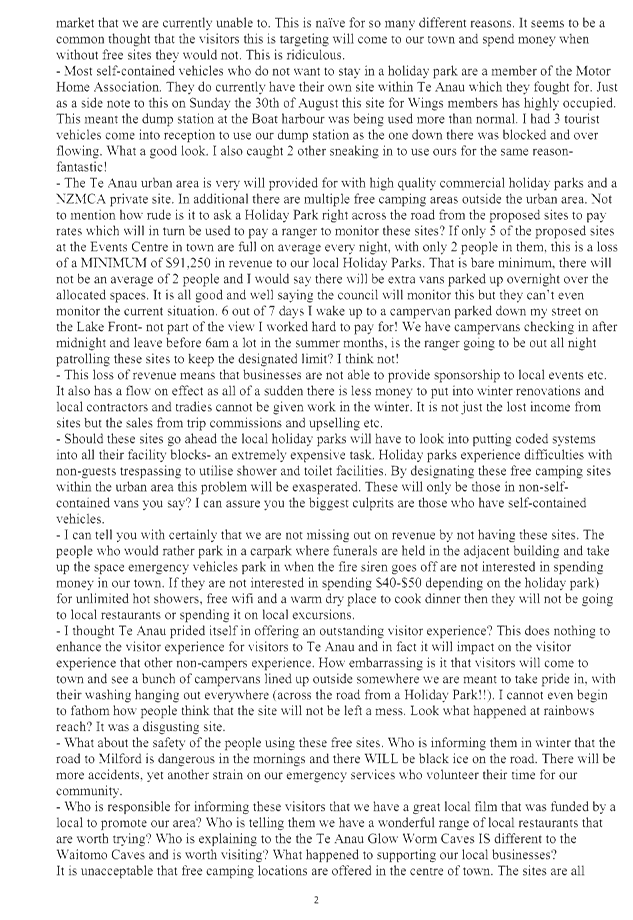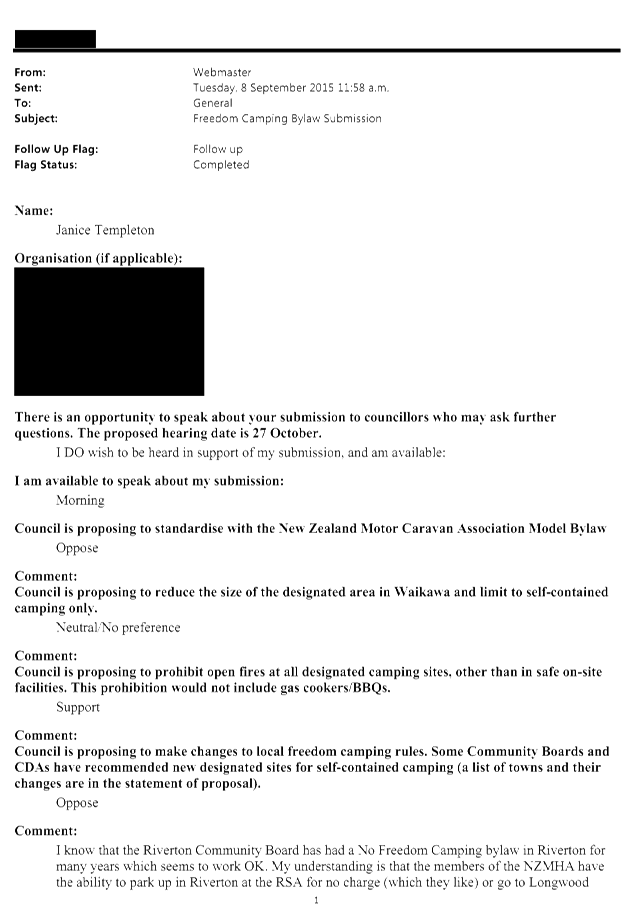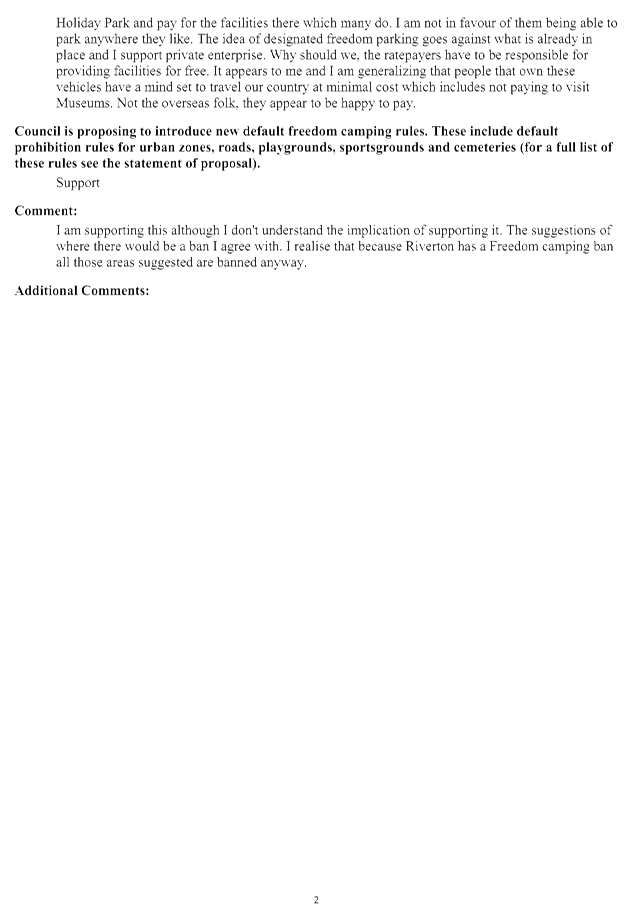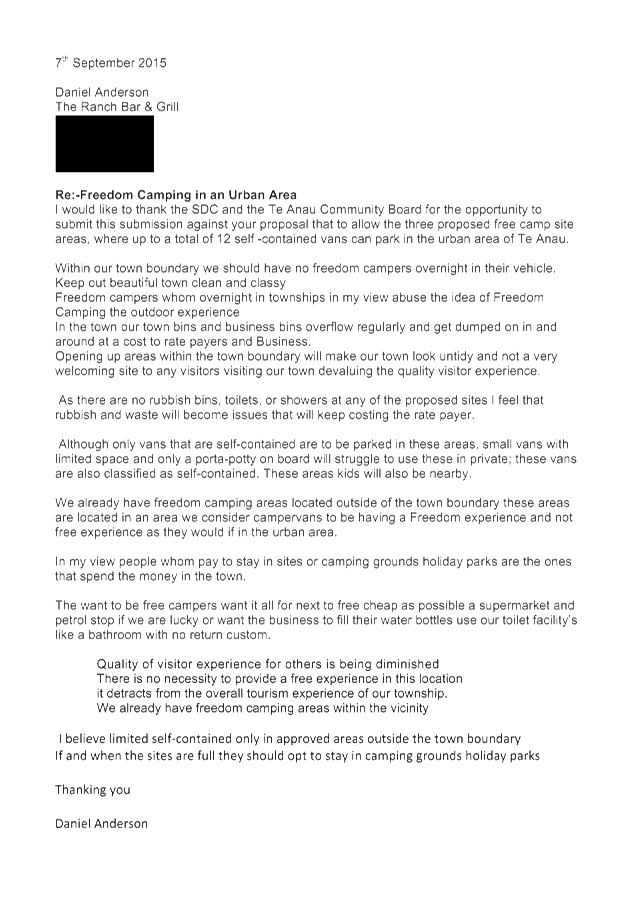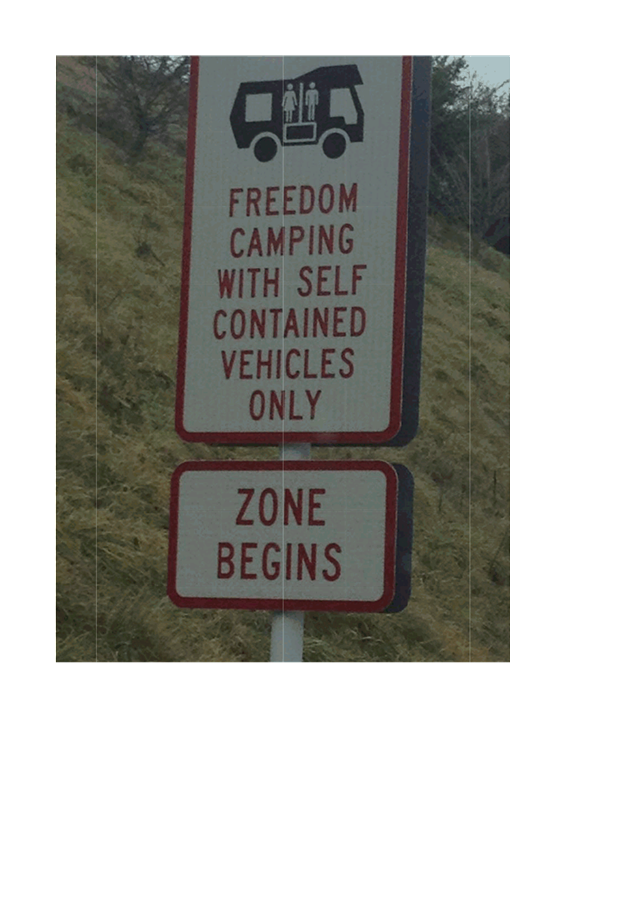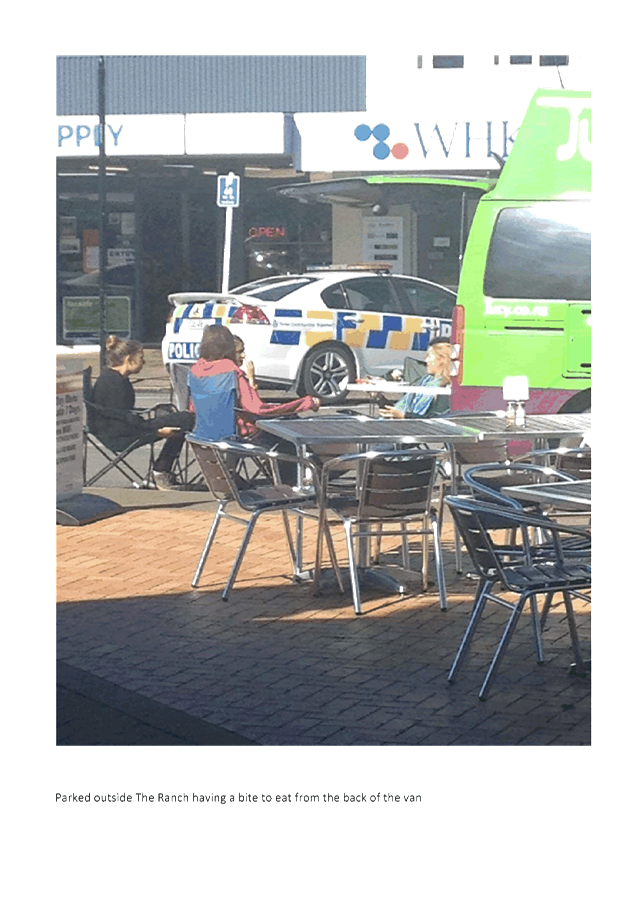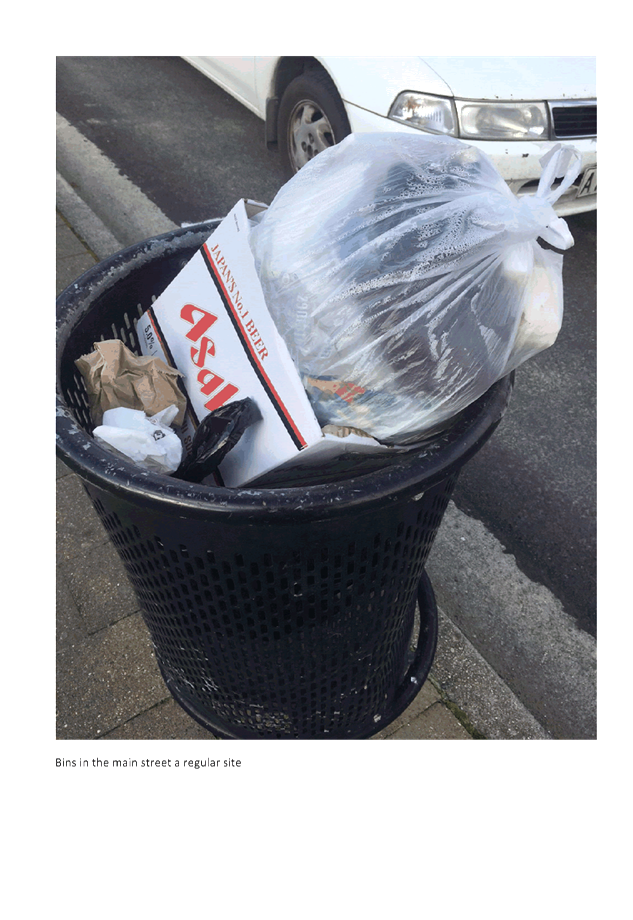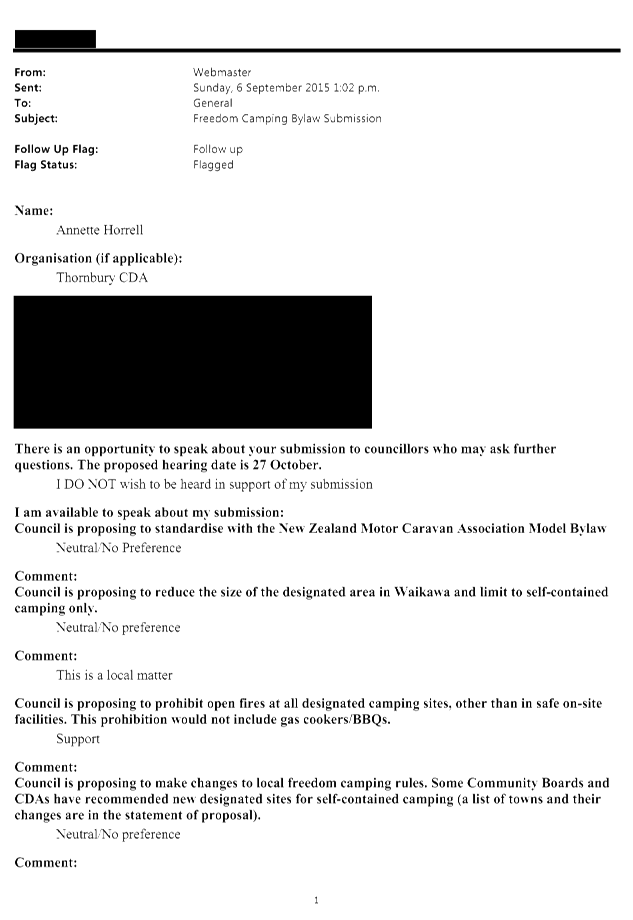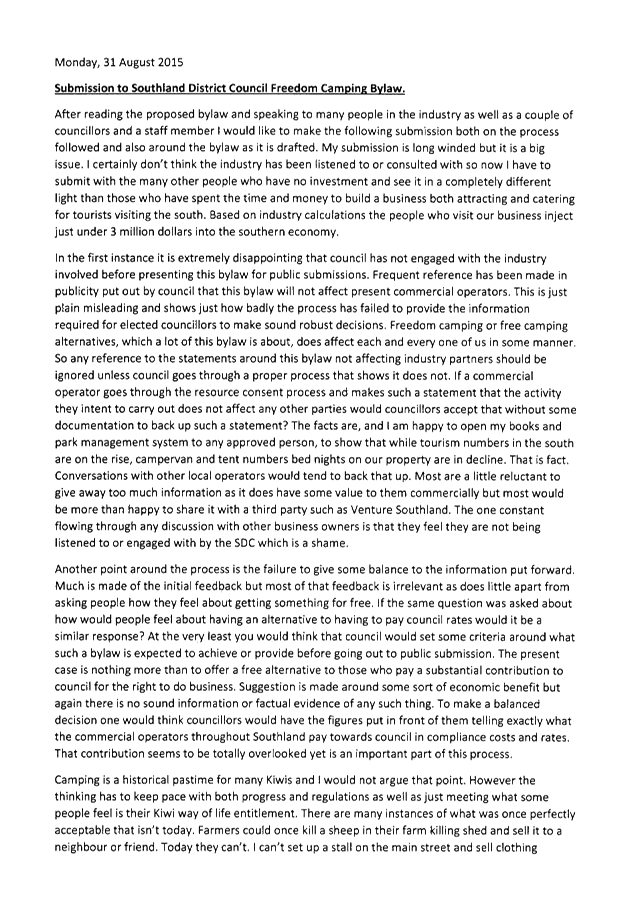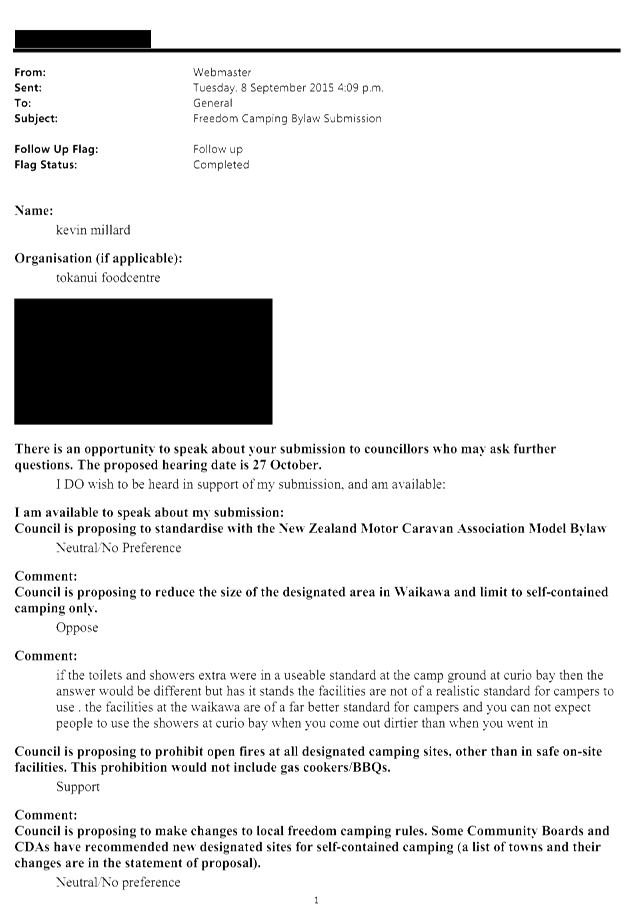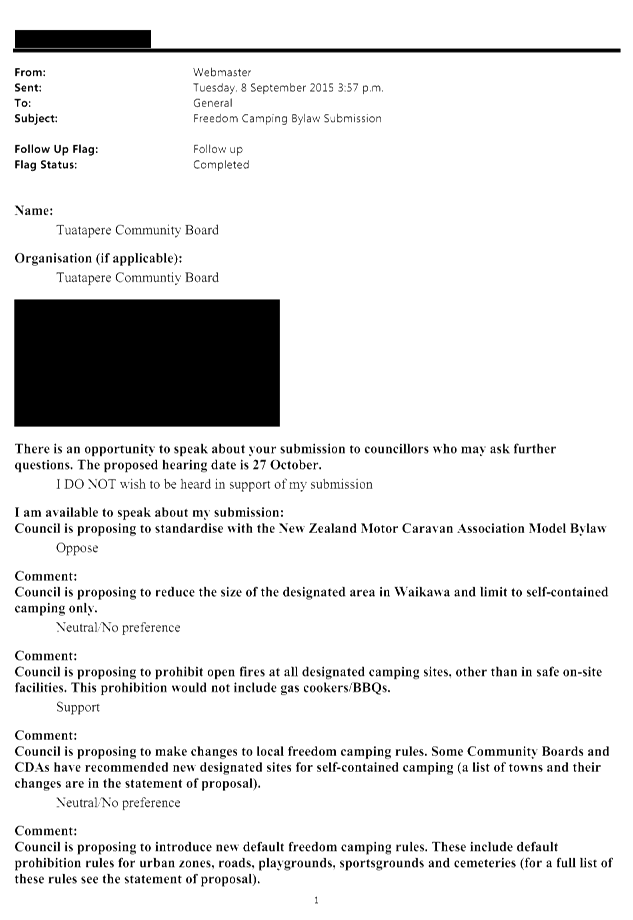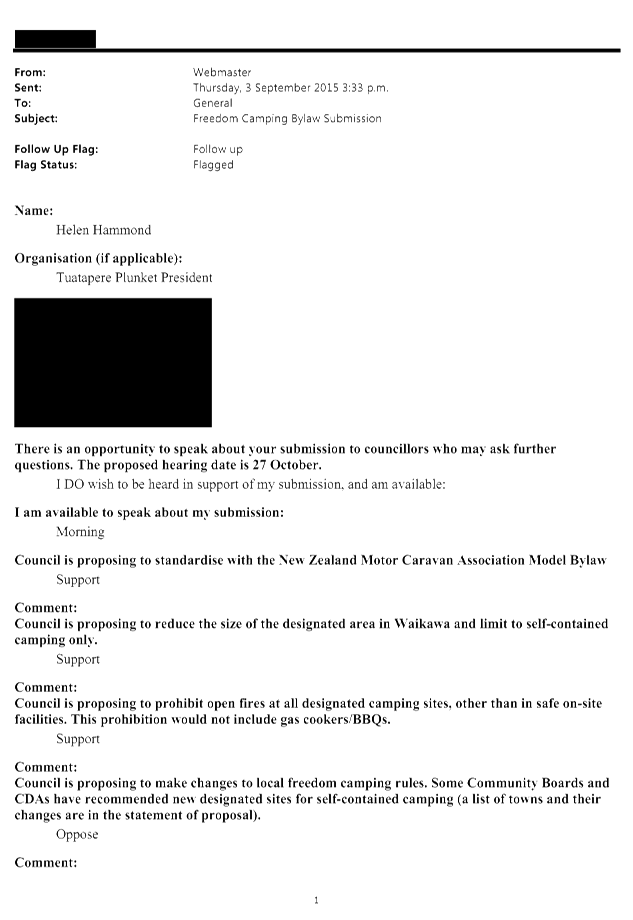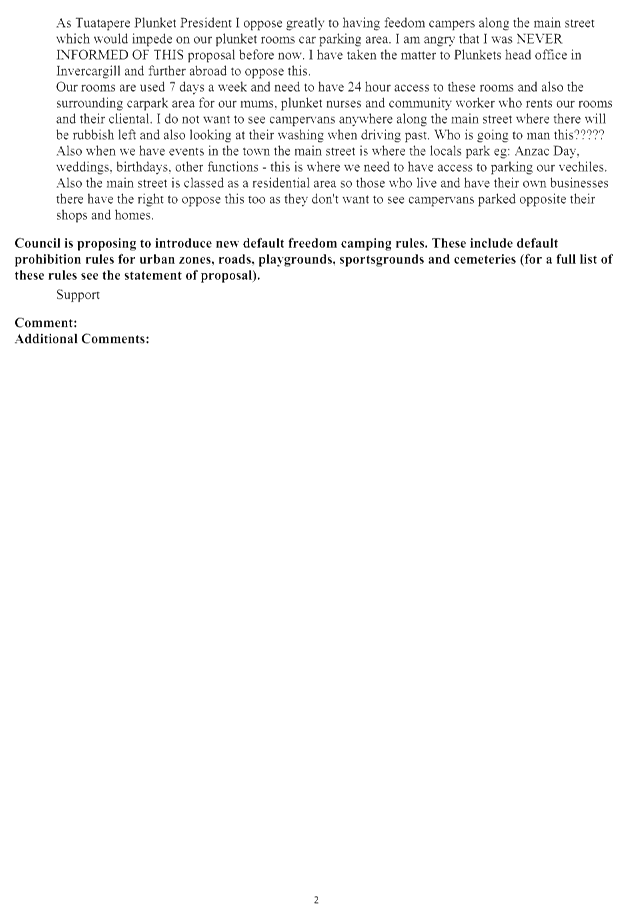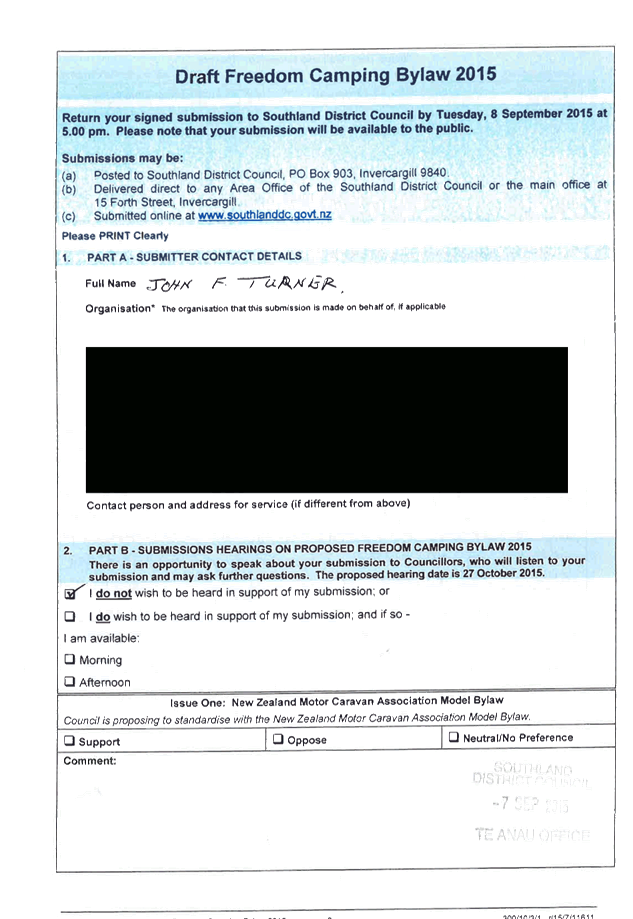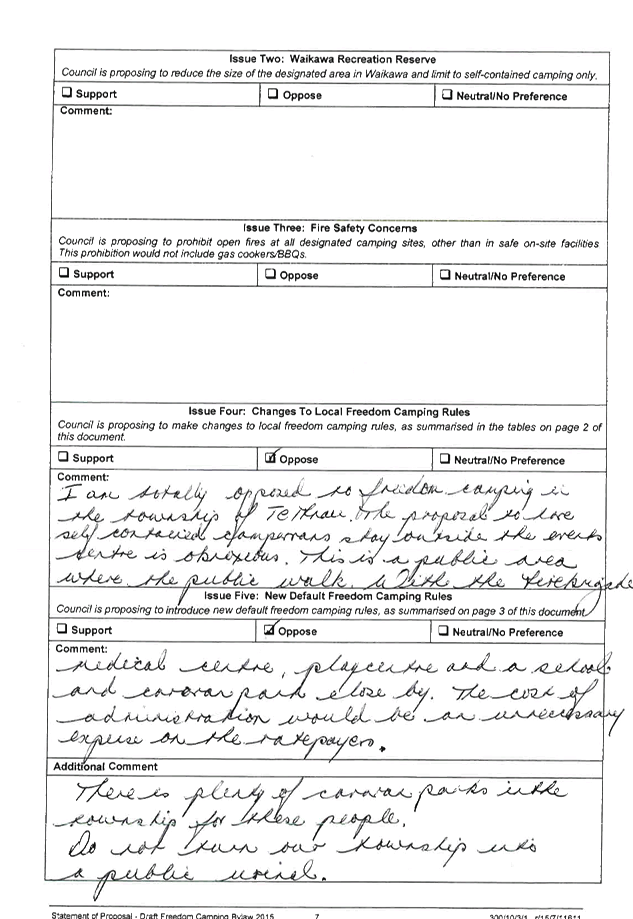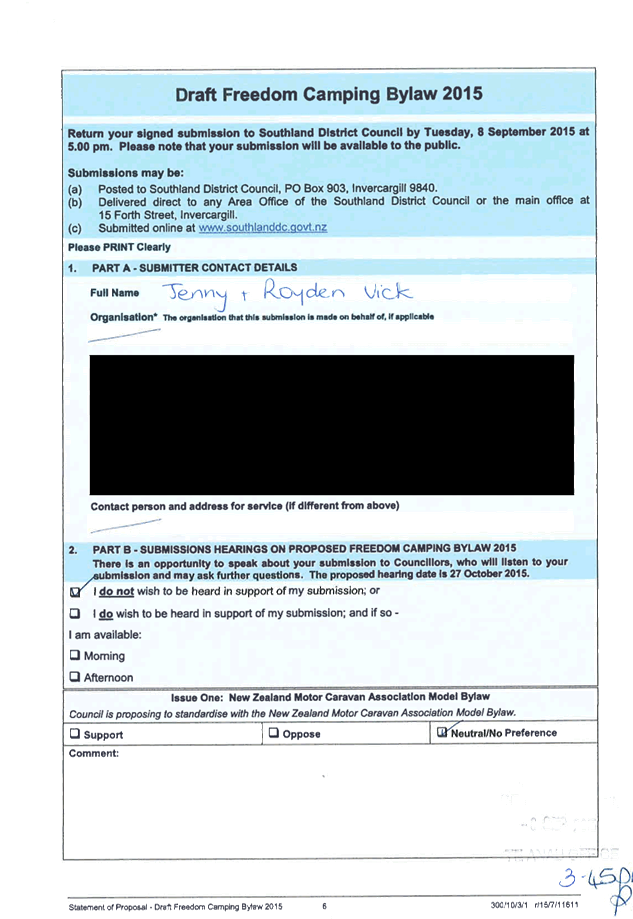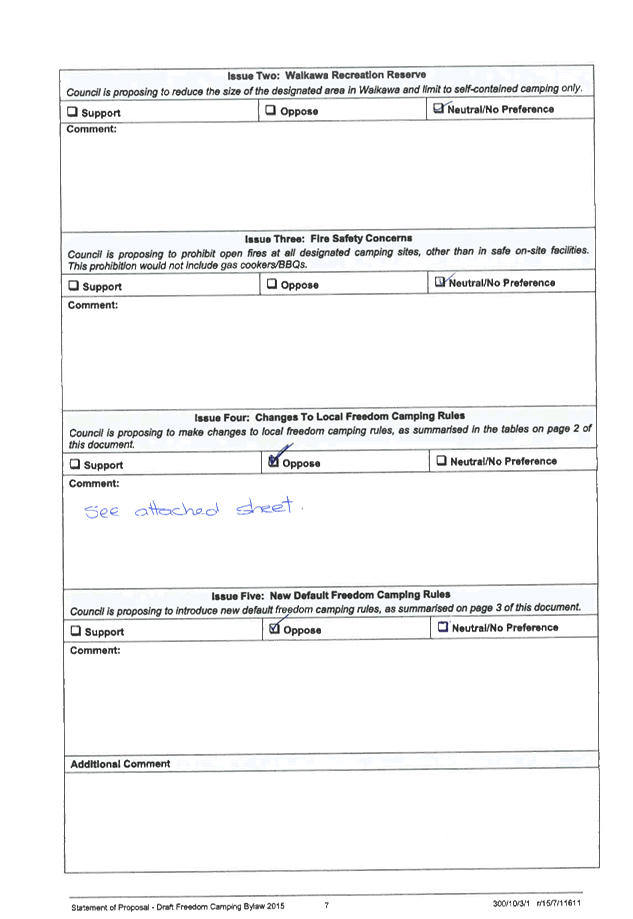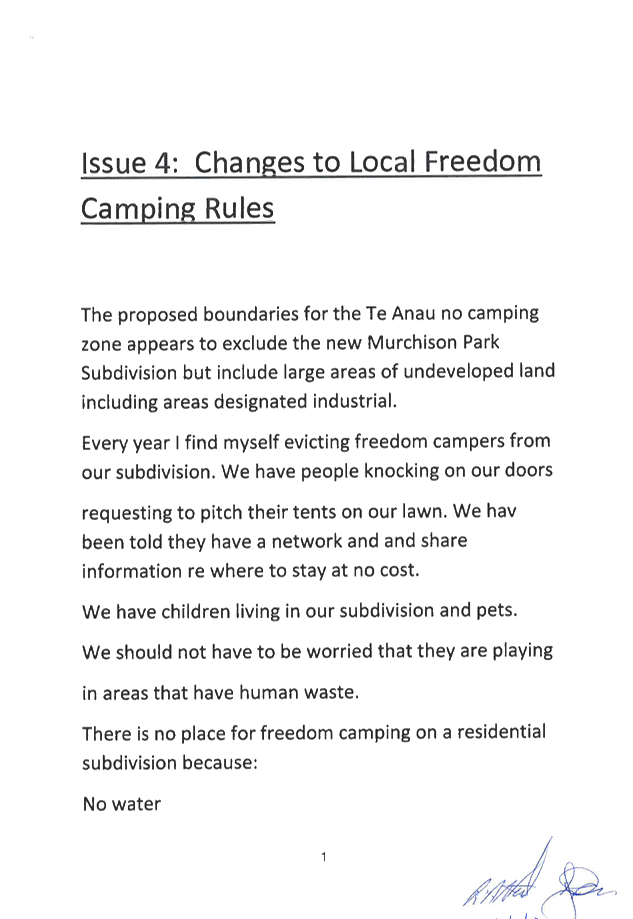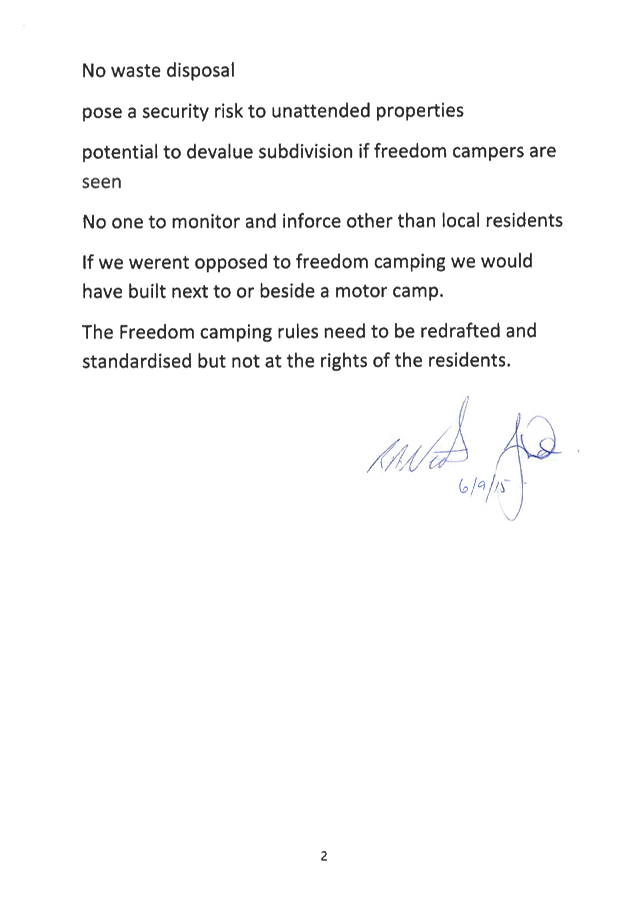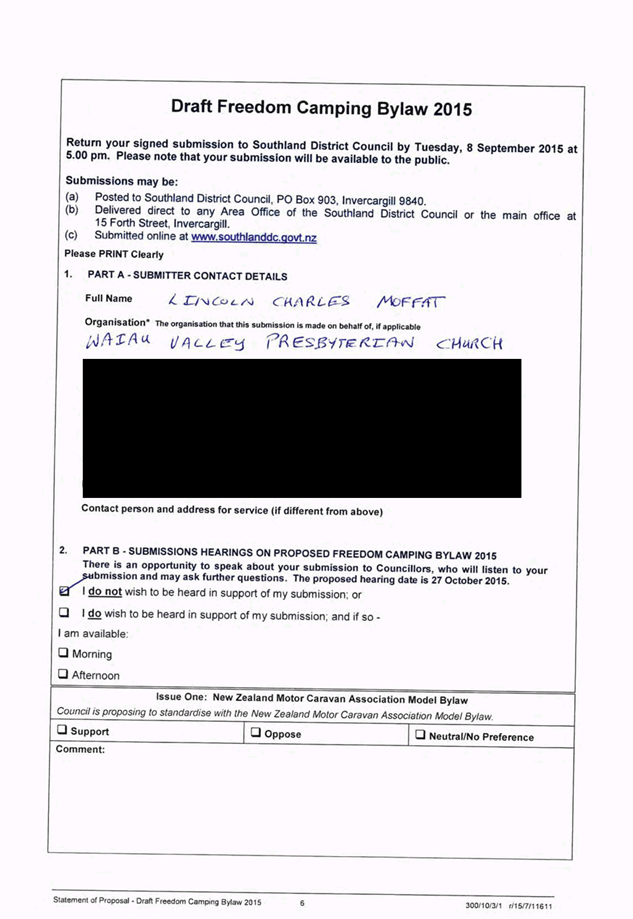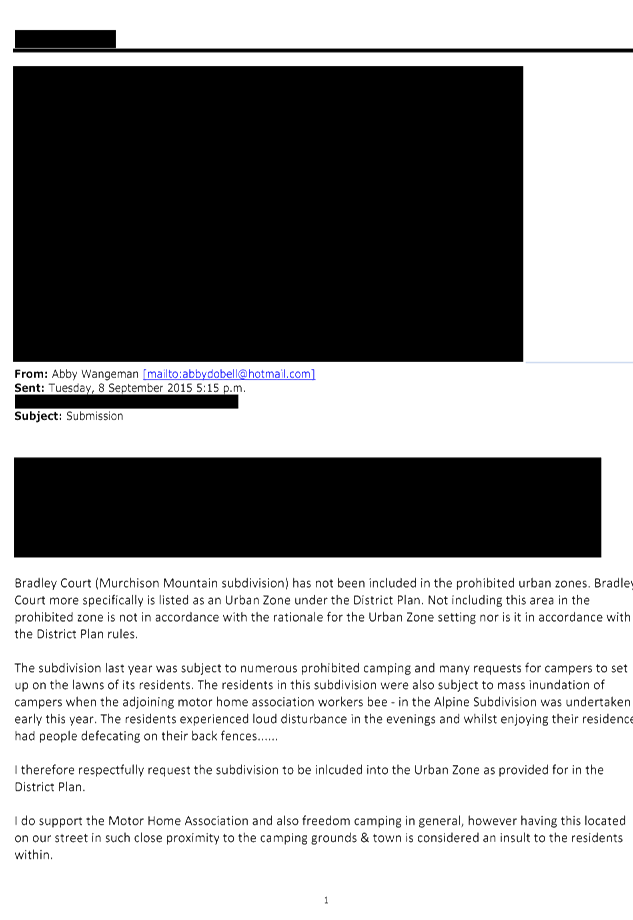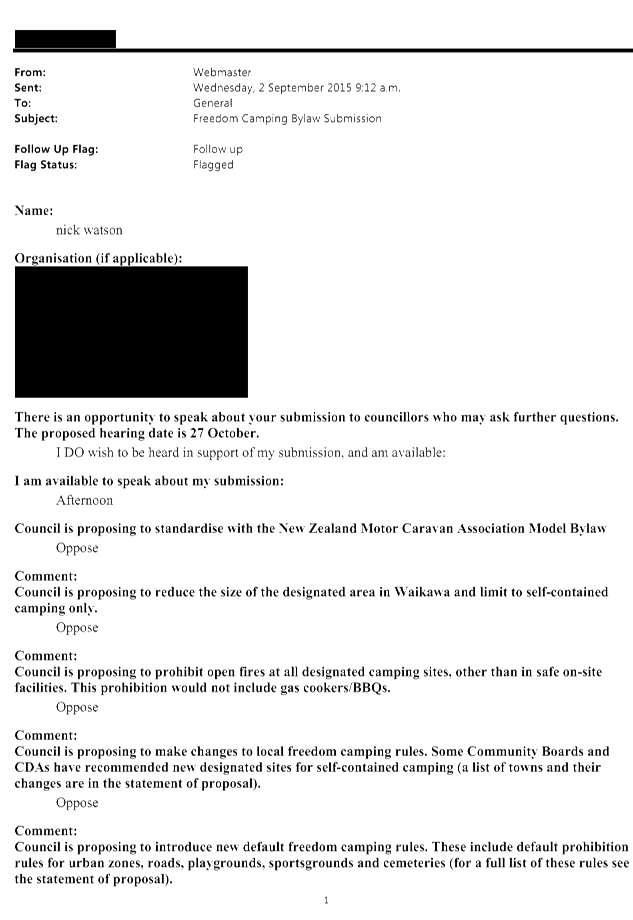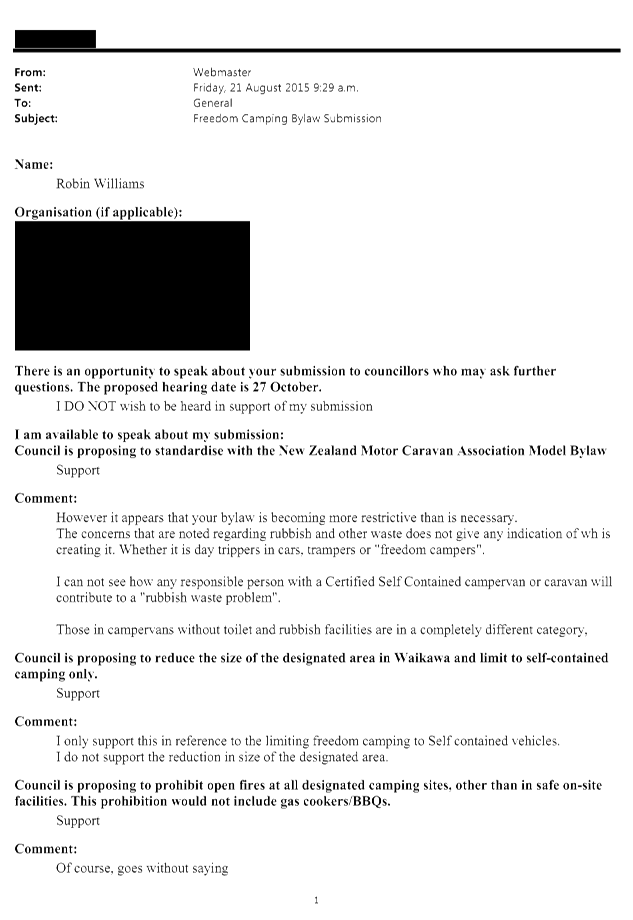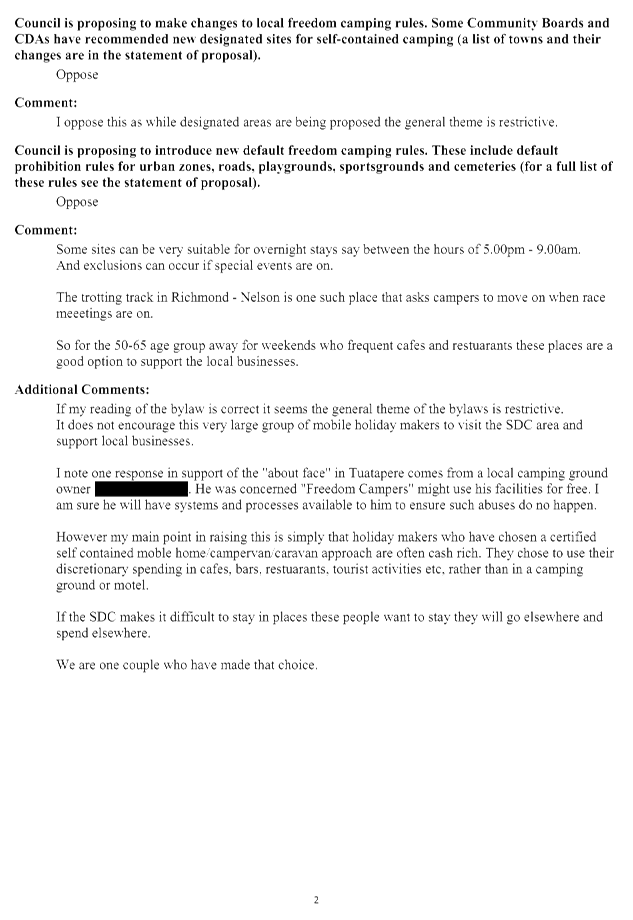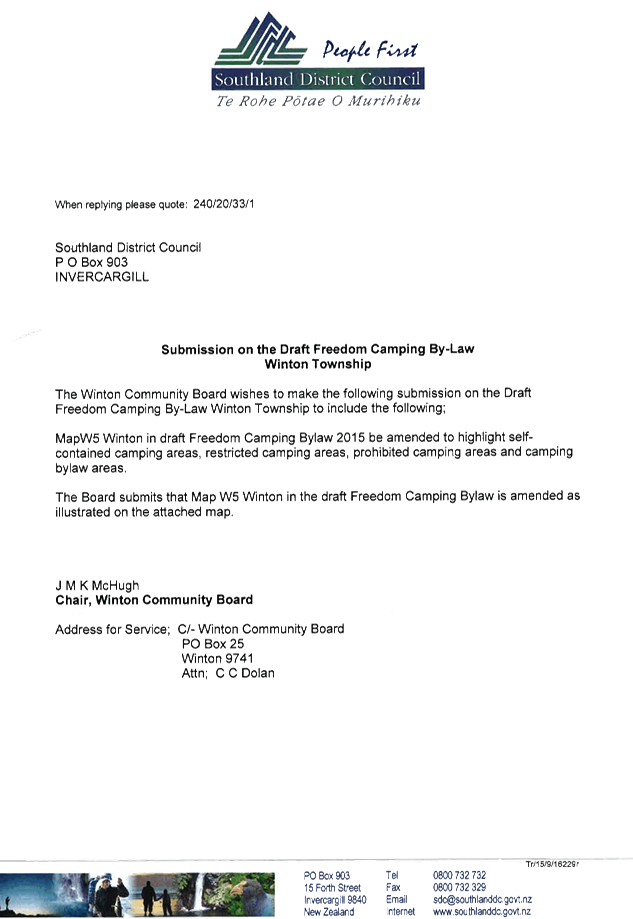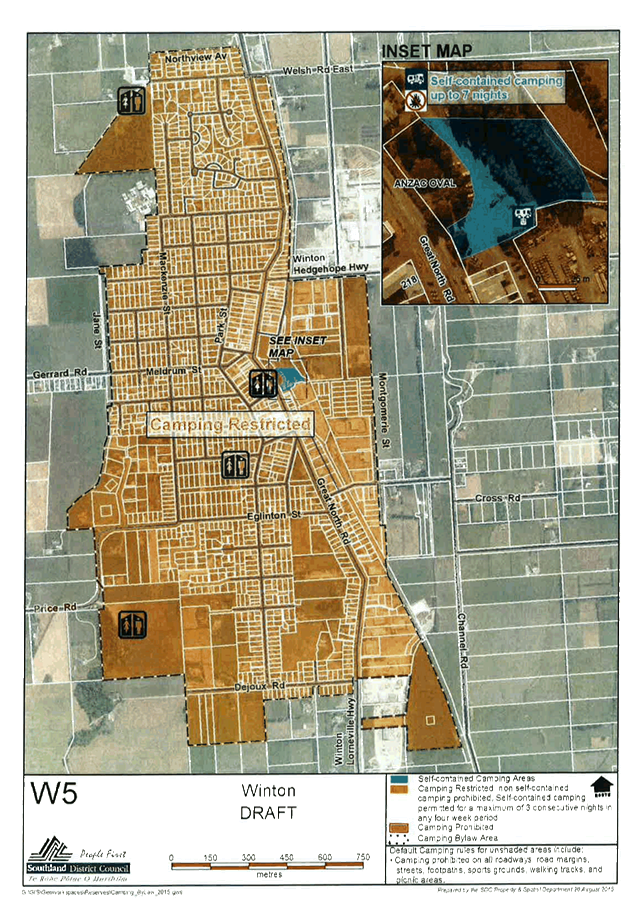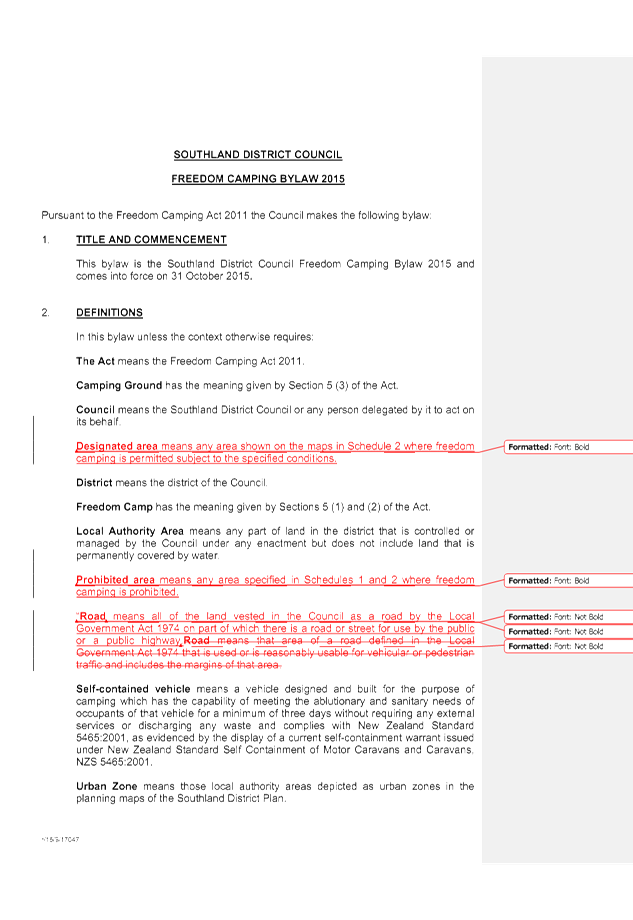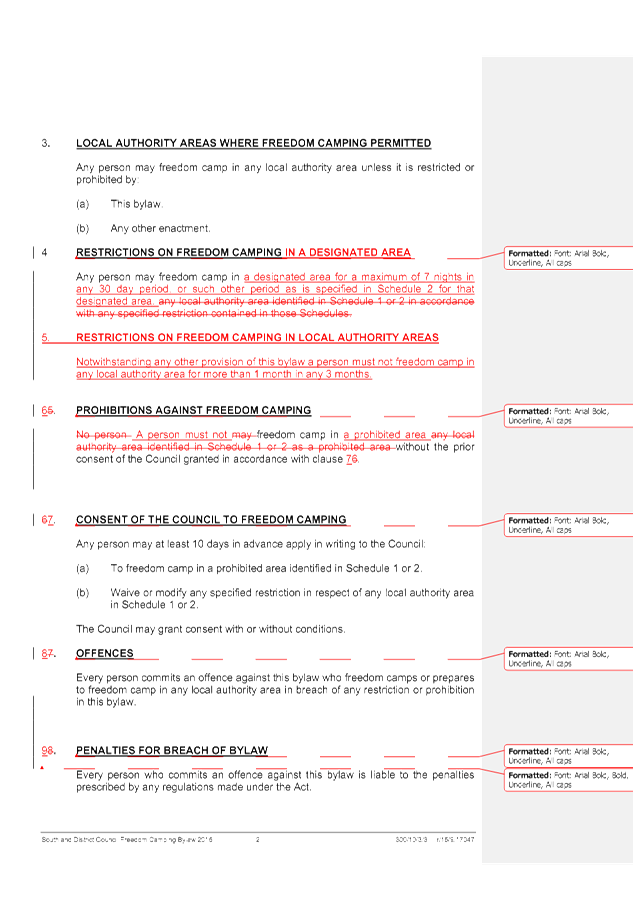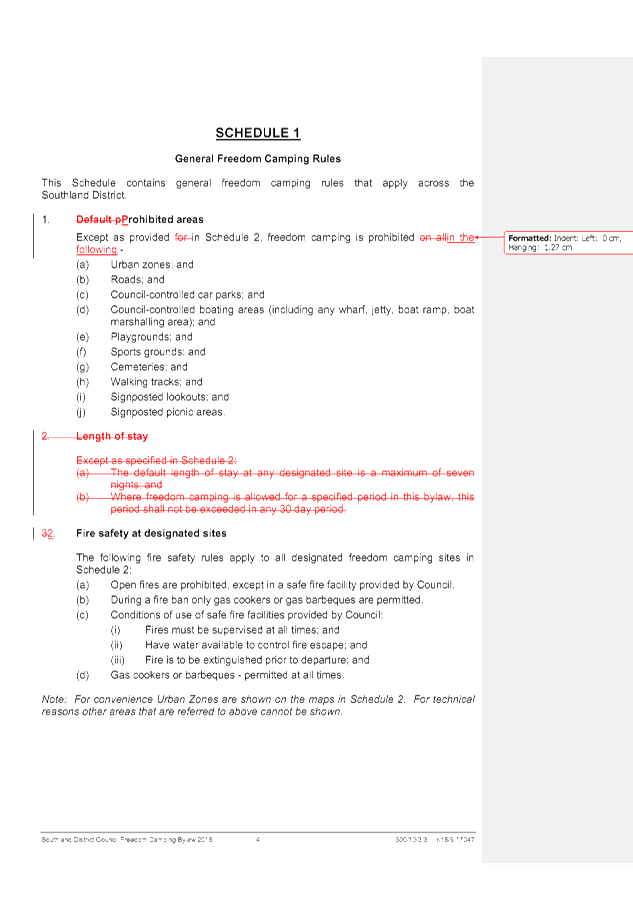|
Extraordinary
Council
27 October
2015
|

|
Draft Freedom Camping Bylaw 2015
Record No: R/15/9/16448
Author: Michael
Sarfaiti, Environmental Health Manager
Approved by: Bruce
Halligan, GM - Environment and Community
☒
Decision ☐ Recommendation ☐ Information
Purpose
1 To hear
submissions on the draft Freedom Camping Bylaw 2015 and to deliberate.
Executive Summary
2 Thirty
people and organisations have asked to be heard, out of the 84 total
submissions received. Council will have these key matters to consider:
· Most
submitters support the proposed Waikawa freedom camping site changes and the
new general freedom camping rules.
· There
was a lot of opposition to the proposed local rules concerning Riverton,
Tuatapere, and particularly Te Anau. If Council accepts the submissions
from the local boards of these towns, then almost all of these concerns will be
resolved.
· It
is unclear whether the New Zealand Motor Caravan Association (NZMCA) will
recognise Southland District towns as being motor home friendly
|
Recommendation
That the Council:
a) Receives
the report titled “Draft Freedom Camping Bylaw 2015” dated
19 October 2015.
b) Determines
that this matter or decision be recognised as not significant
in terms of Section 76 of the Local Government Act 2002.
c) Determines
that it has complied with the decision-making provisions of the Local
Government Act 2002 to the extent necessary in relation to this decision; and
in accordance with Section 79 of the Act determines that it does not require
further information, further assessment of options or further analysis of
costs and benefits or advantages and disadvantages prior to making a decision
on this matter.
d) Determines
that it is satisfied that -
(i) the
bylaw is necessary for one or more of the following purposes:
(1) to
protect the area:
(2) to
protect the health and safety of people who may visit the area:
(3) to
protect access to the area; and
(ii) the
bylaw is the most appropriate and proportionate way of addressing the
perceived problem in relation to that area; and
(iii) the
bylaw is not inconsistent with the New Zealand Bill of Rights Act 1990.
e) Receives
the submissions on the proposed Draft Freedom Camping Bylaw 2015.
f) Deliberates
on the Draft Freedom Camping Bylaw 2015.
g) Instructs
staff to make any changes to the Draft Freedom Camping Bylaw 2015 as
required.
|
Content
|
Abbreviations
and definitions:
Act:
Freedom Camping Act 2011
CBs and CDAs: Community Boards and Community Development
Area Subcommittees.
Freedom camp means to camp (other than at a camping ground)
within 200 m of a motor vehicle accessible area or the mean low-water
springs line of any sea or harbour, or on or within 200 m of a formed
road or a
Great Walks Track, using one or more of the following:
(a) A tent or other temporary
structure:
(b) A caravan:
(c) A car, campervan, house-truck,
or other motor vehicle.
NZMCA: New Zealand Motor Caravan Association
Self-contained vehicle is a vehicle that is designed to completely meet the
ablutionary and sanitary needs of the occupants (including water for drinking
and cooking) for a minimum of three days without requiring any external
services or discharging any waste. They have the following:
1. Fresh water supply
2. A sink
3. Toilet
4. Holding tank
5. An evacuation hose
6. A sealable refuse
container (with lid)
3
|
Background
4 The
Policy Review Committee (1 April 2015) considered a staff report about freedom
camping, in particular about:
· Problems
at the Waikawa freedom camping site.
· A
new model bylaw.
· The
NZMCA motorhome friendly town scheme.
5 The
Committee instructed staff to undertake a review of the Camping Control Bylaw
2012. It was noted that this bylaw was not technically due for review
until 2022 under the Local Government Act 2002, but the Committee
considered that an earlier review was appropriate in response to these
matters. Staff organised a public survey and also sought views from CBs and
CDAs.
6 Key
conclusions from the consultation were:
· The
greatest concern with freedom camping is non-self-contained camping and the
least concern is self-contained camping.
· Freedom
camping provides significant economic benefit.
· Self-contained
camping should be generally permitted, and non-self-contained camping generally
prohibited.
7 Council
(5 August 2015) viewed a draft Freedom Camping Bylaw. The draft was based
on the model bylaw and included the views of the public.
The draft bylaw aimed to
achieve the following:
· Conform
with the NZMCA model bylaw.
· Resolve
the Waikawa Domain freedom camping problems.
· Resolve
the concerns of the Southern Rural Fire Authority.
· Add
designated sites for self-contained camping.
· Introduce
new default rules.
8 The
submissions received are in Attachment A.
9 The
proposed Freedom Camping Bylaw 2015 is in Attachment B. A
summary of the proposed changes to local freedom camping rules is in Attachment
C. Both attachments have been updated with the submissions
received from the CBs during the submissions period.
Discussions with the NZMCA
10 A
key goal of this review was to enable some towns to achieve motor home friendly
town recognition from the NZMCA. The Otautau, Riverton, and Winton
communities had already been in talks with the NZMCA. These discussions
had come to a halt because of the NZMCA’s concerns with the 2012
Southland District Council Camping Bylaw.
11 The
local NZMCA President, Mr Neville Stirling, attended two of the community
meetings that discussed freedom camping, during the pre-draft development
process (Centre Bush/Limehills and Winton). Mr Stirling advised that
the resolutions from the meetings were entirely acceptable to the NZMCA.
He in turn was liaising with the NZMCA CEO, Mr Bruce Lochore.
12 During the
submissions period Mr Lochore raised concerns with the draft bylaw.
Following dialogue with Mr Lochore he indicated that Otautau, Riverton,
and Winton would achieve motor home friendly town recognition if:
• Otautau,
Riverton and Winton changed to be restricted to self-contained campers only,
while retaining the designated sites; and
• Council
reconsiders the proposed rule of prohibition of freedom camping on roads.
I asked for the NZMCA to suggest an alternative rule that would satisfy
Council’s safety concerns; including a time limit rule, but this did not
occur.
13 Mr
Lochore could not advise if any other town would be recognised as motor home
friendly, as no other town had approached the NZMCA.
14 Officers
notified the Chairs of the Boards of Edendale/Wyndham, Lumsden, Nightcaps,
Otautau, Riverton, and Winton. These were the towns that were potentially
large enough to be considered as motor home friendly towns, as indicated by Mr
Lochore. Medical facilities for example are one of the criteria for a motor
home friendly town, and our smaller towns do not have them.
15 The
Boards of Lumsden, Otautau and Winton later submitted to accept these
changes. Riverton resolved to retain the current status quo which is
prohibition on all freedom camping within the town boundary.
16 The
Te Anau Community Board was not included in this round of discussions, as the
Board had already advised that the draft rules were contentious. The
Board later submitted to request complete prohibition of freedom camping within
the Te Anau township (they can’t “ban” it on their own),
during the submissions period.
Issues
17 Key issues are
discussed in the Deliberations Booklet in Attachment D. The
booklet will be provided in hardcopy form on the day of the hearing. The
key issues are hence not repeated in this report.
Other issues of interest are discussed below:
Issue 1 -
Sanitary education of freedom campers
18 A submitter suggested
that a book on the sanitary disposal of human waste should be summarised, and
used to educate campers.
19 This sort of information
is already available, eg “Disposing of human waste where no toilets are
provided” on the DOC website.
20 This information should
be more widely available. I will:
· Ask
the Tourism Industry Association to have this information on their
“Camping Our Way” website,
· Place
the Ministry of Health’s “Keeping Healthy Outdoors” education
resource on the freedom camping section of our website.
Issue 2 -
Donations at designated sites
21 Some submitters
suggest that a donations box should be at some designated sites.
A designated site would need a camping ground license from Council if it had a
donations box. This can be done if Council wishes, but it could be quite
administratively
resource-hungry and also owners of commercial camping grounds may raise
concerns if this happened.
Issue 3 -
Certain locations
22 Submitters raised
concerns about the following locations:
· Clifden
Caves needing better protection. This is a DOC managed site, and Council
cannot regulate freedom camping on DOC land.
· Prohibiting
camping on Deaker Road in Te Anau. Council is proposing to prohibit
camping on all roads under the bylaw as notified.
Issue 4 -
Consistency with other neighbouring councils
23 Some submitters
request alignment with other neighbouring councils, particularly
Clutha District. Clutha District Council (CDC) prohibits
non-self-contained freedom camping, and restricts self-contained camping to
non-urban areas and designated sites.
24 CDC’s current
stance is a relatively prohibitive approach which, if Southland District
Council mirrored it, could create legal problems for traditional camping, eg,
scouts, white baiters, and family camping. Council could face some
opposition if it wished to do the same.
Issue 5 - Clarification
from the NZMCA
25 The draft bylaw has
been drafted in line with the expectations of the NZMCA, as described in the Background
above. The NZMCA’s submission raises various concerns with the
bylaw. Council should hopefully get a clearer indication whether the
NZMCA will approve motor home friendly town recognition to Lumsden, Otautau,
and Winton during the hearing.
Issue 6 -
Updates to the draft bylaw
26 The definition of
“road” has been updated. The former version may have picked
up a number of unformed legal roads throughout the District.
27 The schedules and the
provisions that refer to them have been updated to make it clearer as to what
Council intends.
28 These updates can
be seen in the “tracked changes” version of the bylaw in Attachment E.
Factors to Consider
Legal and Statutory
Requirements
29 I have referred to
“A guide to freedom camping bylaws under the Freedom Camping Act
2011”. This guide was prepared by Chen Palmer and commissioned by
the NZMCA.
30 Section 11(2) of
the Act requires:
A local authority
may make a bylaw under subsection (1) only if it is satisfied that—
(a)
the bylaw is necessary for 1 or more of
the following purposes:
(i)
to protect the area:
(ii)
to protect the health and safety of people
who may visit the area:
(iii)
to protect access to the area; and
(b)
the bylaw is the most appropriate and
proportionate way of addressing the perceived problem in relation to that area;
and
(c) the bylaw is
not inconsistent with the New Zealand Bill of Rights Act 1990.
31 Paragraphs (a) to (c) are
discussed below.
Purposes of the
proposed bylaw
32 The restrictions in the
proposed bylaw are necessary for the following purposes:
(i) To
protect the area –
· Local
township rules
· Prohibition
in urban zones, playgrounds, cemeteries, walking tracks, picnic areas
· Fire
safety rules.
(ii) To
protect the health and safety of people who may visit the area –
· Prohibition
on roads
(iii) To
protect access to the area –
· Prohibition
on car parks, boating areas, sports grounds, lookouts.
Is
the bylaw an appropriate and proportionate response?
33 The proposed bylaw is
considered to be the best available solution to the problems that have been
identified. Local communities have clearly advised of their desire to be
protected from the adverse effects from non-self-contained camping in particular.
Most communities are generally supportive of self-contained camping but wish to
confine it to designated sites, so that adverse effects can be managed and
mitigated.
34 The District will remain
relatively permissive to freedom camping under the proposed bylaw. People will
be able to camp at these places:
· Vast
areas of Conservation land where camping is not otherwise restricted by DOC.
· Council
controlled land at designated sites, parks, riversides, and most beach
areas. Some beaches are totally covered by high tide though, eg
Colac Bay.
· Many
Southland District townships at designated sites, spread all round the
District.
· Back
country areas on Council controlled land. Back country camping is not
‘freedom camping’ by definition.
· Low
cost identified DOC camping grounds.
Consistency
with the New Zealand Bill of Rights Act 1990 (NZBORA)
35 Under Section 18(1) of
the NZBORA:
•
Everyone lawfully in New
Zealand has the right to freedom of movement and residence in New Zealand.
36 A limitation on a right
or freedom may be consistent with the NZBORA where it is justified under
Section 5 of that Act. This report summarises the assessment completed by
staff that justifies the reasonable limits on rights of freedom, on the basis of
the protection of:
· The
areas;
· The
health and safety of the people who may visit the areas;
· Access
to those areas.
Community
Views
37 Staff arranged a public
survey, and consulted with all of the CBs and CDAs. The public was
formally consulted using the special consultative procedure.
Costs
and Funding
38 There may be costs
associated with new signage. Some communities may request a compliance
service in time, should future issues arise. Currently the Te
Anau/Manapouri area is the only area with a formalised local compliance
service.
Policy Implications
39 There are no policy
implications.
Analysis
Options Considered
40 The options are
whether to hear and deliberate on the submissions on the draft Freedom Camping
Bylaw 2015 and to continue, or to hear the submissions and stop the process.
Analysis of Options
41 Option 1 - To
hear the submissions on the draft Freedom Camping Bylaw 2015 and to continue
the adoption process
|
Advantages
|
Disadvantages
|
|
· Addresses
concerns of our communities and other stakeholders.
· Some
of our communities may be able to progress discussions with the NZMCA
· Will
enable the Council to move along campers who are camping in unsuitable and
unsafe areas.
· Will
continue to enable freedom camping in the District.
|
· Negative
feedback from members of community that disagree with the direction that the
bylaw is taking.
· Costs
of implementation.
|
42 Option 2 - To
hear the submissions and stop the process
|
Advantages
|
Disadvantages
|
|
· The
current Camping Control Bylaw 2012 is not required to be reviewed until
19 September 2022.
|
The opposite of advantages above.
|
Assessment of Significance
43 This review is
considered to be not significant, in accordance with Council’s
Significance and Engagement Policy.
Recommended Option
44 To hear the
submissions on the draft Freedom Camping Bylaw 2015 and to continue the
adoption process (Option 1).
Next Steps
45 Officers will
present a report to Council on 18 November 2015. Council will need to
decide on the options in the report and whether to adopt the proposed bylaw.
Attachments
a Submissions
Booklet - Redacted Version View
b DRAFT
Freedom Camping Bylaw View
c Summary
of changes to local freedom camping rules View
d Freedom
Camping Bylaw Hearing 27 October 2015 View
e DRAFT
Freedom Camping Bylaw 2015 - Tracked Changes View

SOUTHLAND
DISTRICT COUNCIL
FREEDOM CAMPING
BYLAW 2015
Pursuant to the Freedom Camping Act 2011 the Council makes
the following bylaw:
1. TITLE AND
COMMENCEMENT
This bylaw is the Southland
District Council Freedom Camping Bylaw 2015 and comes into force on 31 October
2015.
2. DEFINITIONS
In
this bylaw unless the context otherwise requires:
The
Act means the Freedom Camping Act 2011.
Camping Ground has the
meaning given by Section 5 (3) of the Act.
Council means the
Southland District Council or any person delegated by it to act on its behalf.
Designated area means any
area shown on the maps in Schedule 2 where freedom camping is permitted subject
to the specified conditions.
District means the
district of the Council.
Freedom Camp has the
meaning given by Sections 5 (1) and (2) of the Act.
Local Authority Area means
any part of land in the district that is controlled or managed by the Council under
any enactment but does not include land that is permanently covered by water.
Prohibited area means any
area specified in Schedules 1 and 2 where freedom camping is prohibited.
Road means all of the land
vested in the Council as a road by the Local Government Act 1974 on part of
which there is a road or street for use by the public or a public highway.
Self-contained vehicle means
a vehicle designed and built for the purpose of camping which has the
capability of meeting the ablutionary and sanitary needs of occupants of that
vehicle for a minimum of three days without requiring any external services or
discharging any waste and complies with New Zealand Standard 5465:2001, as
evidenced by the display of a current self-containment warrant issued under New
Zealand Standard Self Containment of Motor Caravans and Caravans, NZS
5465:2001.
Urban Zone means those
local authority areas depicted as urban zones in the planning maps of the
Southland District Plan.
3. LOCAL AUTHORITY
AREAS WHERE FREEDOM CAMPING PERMITTED
Any person may freedom camp in
any local authority area unless it is restricted or prohibited by:
(a) This
bylaw.
(b) Any
other enactment.
4 Restrictions on Freedom Camping in a
designated area
Any person may freedom camp in a
designated area for a maximum of seven nights in any 30 day period, or such
other period as is specified in Schedule 2 for that designated area.
5. Restrictions on Freedom Camping in local
authority areas
Notwithstanding any other
provision of this bylaw a person must not freedom camp in any local authority
area for more than one month in any three months.
6. Prohibitions against Freedom Camping
A person must not freedom camp in
a prohibited area without the prior consent of the Council granted in
accordance with clause 7.
7. Consent of the Council to Freedom Camping
Any
person may at least 10 days in advance apply in writing to the Council:
(a) To
freedom camp in a prohibited area identified in Schedule 1 or 2.
(b) Waive
or modify any specified restriction in respect of any local authority area in
Schedule 1 or 2.
The Council
may grant consent with or without conditions.
8. Offences
Every person commits an offence
against this bylaw who freedom camps or prepares to freedom camp in any local
authority area in breach of any restriction or prohibition in this bylaw.
9. Penalties for breach of Bylaw
Every person who commits an
offence against this bylaw is liable to the penalties prescribed by any
regulations made under the Act.
SCHEDULE 1
General
Freedom Camping Rules
This Schedule contains general
freedom camping rules that apply across the Southland District.
1. Prohibited
areas
Except
as provided in Schedule 2, freedom camping is
prohibited in the following -
(a) Urban
zones; and
(b) Roads;
and
(c) Council-controlled
car parks; and
(d) Council-controlled
boating areas (including any wharf, jetty, boat ramp, boat marshalling area);
and
(e) Playgrounds;
and
(f) Sports
grounds; and
(g) Cemeteries;
and
(h) Walking
tracks; and
(i) Signposted
lookouts; and
(j) Signposted
picnic areas.
2. Fire
safety at designated sites
The following fire safety rules apply
to all designated freedom camping sites in Schedule 2:
(a) Open
fires are prohibited, except in a safe fire facility provided by Council.
(b) During
a fire ban only gas cookers or gas barbeques are permitted.
(c) Conditions
of use of safe fire facilities provided by Council:
(i) Fires
must be supervised at all times; and
(ii) Have
water available to control fire escape; and
(iii) Fire
is to be extinguished prior to departure; and
(d) Gas cookers or
barbeques - permitted at all times.
Note:
For convenience Urban Zones are shown on the maps in Schedule 2. For
technical reasons other areas that are referred to above cannot be shown.
SCHEDULE 2
Local Community
Freedom Camping Rules
This Schedule contains freedom camping rules specific to a
local community that are in addition to the freedom camping rules in Schedule
1.
